Apr 2016 1st Edition
Apr 2016 1st Edition Estelle Greeff![]()
Translations:
Make your voice heard
Make your voice heard JoySouth Africans who are eligible to vote will once again have an opportunity to exercise their democratic right by making their mark at the ballot box in the upcoming 2016 Local Government Elections.
 By casting their votes, South Africans not only strengthen the country’s democracy, but also become active citizens by electing leaders of their choice who will help improve their quality of life.
By casting their votes, South Africans not only strengthen the country’s democracy, but also become active citizens by electing leaders of their choice who will help improve their quality of life.
That all-important vote on the ballot paper plays a significant role in keeping ward councillors accountable and ensuring that municipalities go back to basics by delivering services.
For our country’s democracy to remain strong, South Africans must participate in the 2016 Local Government Elections.
Having the opportunity to vote means that South Africans can make their voices heard. But this won’t be possible if people don’t ensure that their names are on the voters’ roll before it closes.
Eligible voters must register to be able to vote in the elections. Those that have already registered must verify their details at the polling station. This is important because South Africans that their details and their wards have not changed.
In his State of the Nation Address, President Jacob Zuma urged all eligible South Africans to register for the elections.
“I wish to call upon all eligible citizens to go out in their numbers to their voting districts and stations to register or to update their information, so that they are ready for this important democratic process,” he said.
Millions of South Africans heeded this call during the first voter registration weekend in March. The IEC has now announced that the final registration weekend will take place on 9-10 April 2016.
More than three million South Africans visited their local voting stations to register, re-register or update their details. Chairperson of the Electoral Commission, Glen Mashinini, said the number of voters who visited voting stations was more than double the number recorded during the first registration weekend for the 2011 Municipal Elections.
This translates into a 23 percent increase in registration activity compared with the first registration weekend for the 2014 National and Provincial Elections. “This bodes extremely well for the upcoming 2016 Municipal Elections and for the future,” said Mashinini.
Even though the first voter registration weekend has passed, there is still time to register. Eligible voters who have not registered or need to verify their details, can do so during office hours at their local Independent Electoral Commission (IEC) office or register to vote on special registration days.
Those who want to register at their local IEC office must call beforehand to make an appointment. This is because the closer the country gets to Election Day the more electoral staff are out of office, conducting voter education in communities.
Another chance to register
Don’t miss the second registration weekend for the 2016 Municipal Elections. Voting stations will be open nationwide for registration from 8am to 5pm on 9 and 10 April 2016.
The youth must register and vote
As the country marks the 40th anniversary of the 1976 Soweto student uprising, it’s only fitting that the youth should go out in their numbers to register so that they can vote and have a say in their future. The current generation of young people should be inspired by the youth of 1976 and take the lead in securing the future of the country.
Many people paid the ultimate price for all South Africans to be able to live in a free and democratic country. While that democracy does get tested from time to time, it does not mean that no progress has been made since 1994.
Who can register?
To register you must be a South African citizen; be at least 16 years old (you can only vote from age 18); and have a green, bar-coded ID book; smartcard ID; or valid Temporary Identity Certificate (TIC).
Applicants will also need to provide an address of where they live that is located in the voting district where they are registering.
If voters don’t have a formal address they must be able to give election officials sufficient details of where they live to confirm they are registering in the correct voting district.
When and where can I register?
You can make an appointment to apply for registration during office hours at the local IEC office responsible for your voting district.
How to know if or where you are registered?
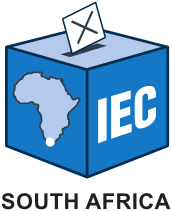 To check your registration details, you can:
To check your registration details, you can:
- send an SMS with your ID number to 32810 (R1.00 per SMS)
- check your registration details online www.elections.org.za
- check at your voting station during a registration weekend (9-10 April 2016)
- check at your local IEC office during office hours.
Applying for a special vote
A special vote allows a registered voter, who can't vote at their voting station on Election Day, to apply to vote on a predetermined day before Election Day. Not every one, however, qualifies for a special vote. Those who wish to apply for a special vote must have the following:
- be a registered voter
- have a green, bar-coded ID book; smartcard ID; or a valid temporary identity (apply at a Home Affairs office)
- meet the conditions for the specific type of election.
You can apply for a special vote if you can’t travel to your voting station because you are physically unwell, disabled or pregnant; or if you can’t vote at your voting station on Election Day.
When do I vote?
By law, special votes can only be cast on the date/s specified in the election timetable and no exceptions can be made.
“Like” the Electoral Commission on Facebook (IECSouthAfrica) or follow the IEC on Twitter (@IECSouthAfrica) to get updates on registration weekend/s dates.
*Additional text from the Independent Electoral Commission
Women-run housing project builds decent homes
Women-run housing project builds decent homes JoyLocal government
Residents that live in villages that fall under the Mogalakwena Municipality will soon be beneficiaries of decent homes.
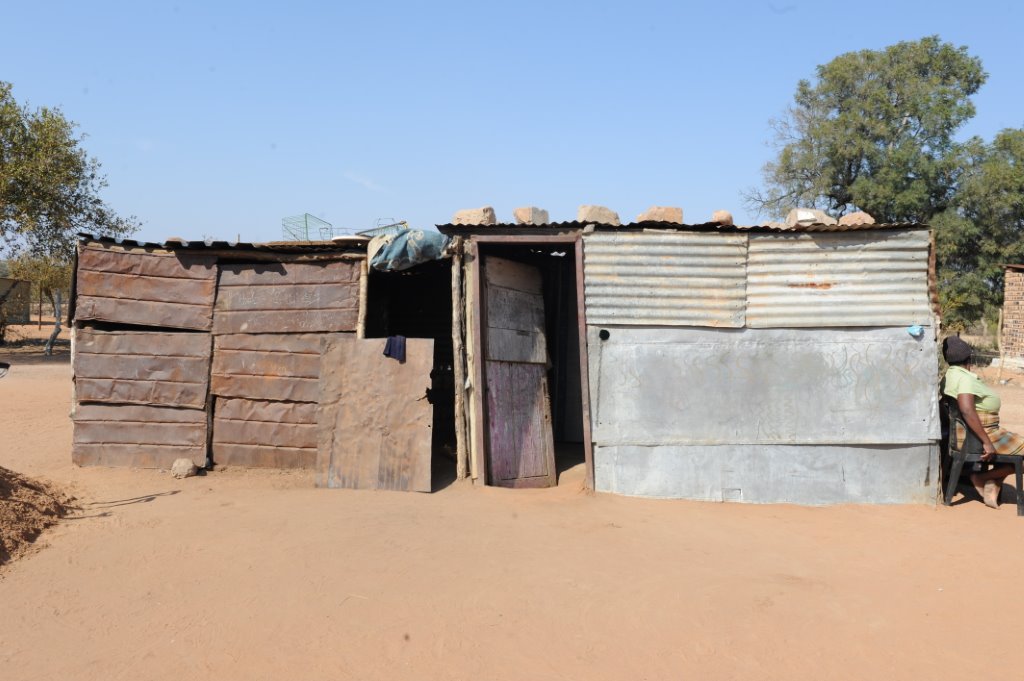 South African National Roads Agency Limited and National Roads Act: Declaration amendment of National Road N4 Section 13: Elandsdrift to Rietvly
South African National Roads Agency Limited and National Roads Act: Declaration amendment of National Road N4 Section 13: Elandsdrift to Rietvly
A total number of 60 families from Ga-Hlako and Tauetsoala villages under Mogalakwena Municipality, Waterberg District Municipality will benefit from the National Department of Human Settlements' annual Women's Build Campaign.
The Women's Build Campaign is a Letsema Project which aims to build houses for vulnerable groups, namely: the elderly, women, people with disabilities and children. It is a partnership project of the Department of Human Settlements, South African Women in Construction and sector stakeholders and is hosted annually in one or more provinces to commemorate Women's Month.
The Women Build Campaign was initiated in 2006 and has built close to 500 housing units across the country since its inception. Speaking during the Build's bricklaying and sod turning event that was held at Taueatsoala village, Deputy Minister of Human Settlements Zou Kota-Fredericks said the project that government at all three spheres is determined to provide decent shelter for South Africans.
“What is more important about the Build is that there is visible partnership between government, private sector and ordinary citizens who have given a lot of effort and time to ensure the success of the project,” said Deputy Minister Kota-Fredericks. Deputy Minister Kota-Fredericks said that they are aware that the area of Taueatsola falls under the municipality that has been experiencing some challenges.
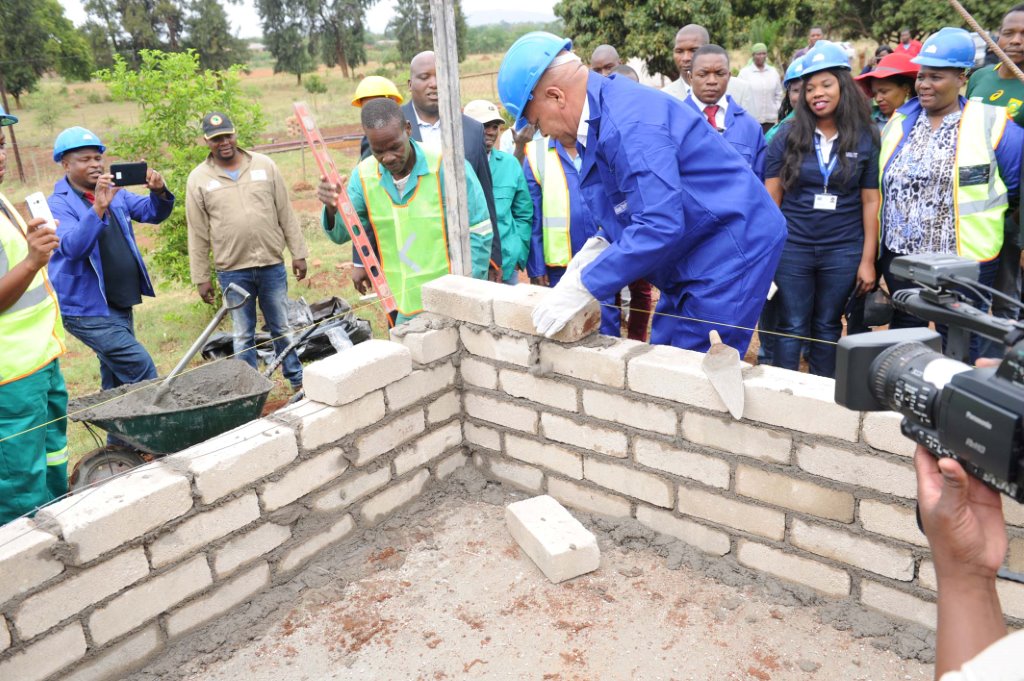 She assured the community that the challenges are being attended to and government is working hard to find a solution.
She assured the community that the challenges are being attended to and government is working hard to find a solution.
“I am pleased to hear that most of the villages around Taueatsoala have electricity and also that some people, assisted by government have come together to produce eggs, toilet paper, sanitary pads and other products.
The MEC for Co-operative Governance, Human Settlements & Traditional Affairs in Limpopo, Makoma Makhurupetje said the department is committed to ensuring that women are empowered and this is evident in the housing projects that have been allocated to women-owned construction companies since 1994.
"In the last and current financial year, Limpopo allocated 5 900 housing projects to 12 women-owned construction companies which culminated in a total of R507 123 551. Our commitment is expressed through the number of housing opportunities we have created for communities. Over 3.3 million opportunities were created through government's subsidised housing programme,” said MEC Makhurupetje.
Building decent homes
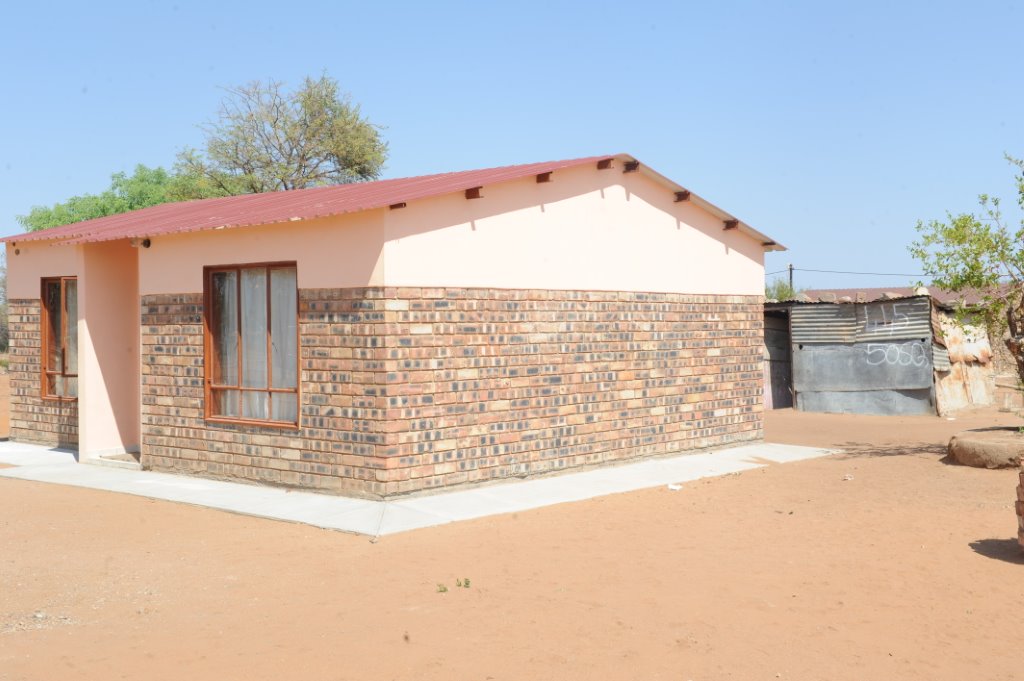 One beneficiary that received a house through the project is Joyce Ramashala (58) from Ga-Hlako village under Mogalakwena Municipality.
One beneficiary that received a house through the project is Joyce Ramashala (58) from Ga-Hlako village under Mogalakwena Municipality.
Life had been very hard for Ramashala and her family who spent many years living in a run-down two-bedroomed shack. The rainy season was particularly difficult for the family.
When the Deputy Minister Kota-Fredericks and MEC Makhurupetje visited her home she could not hide her excitement.
“I am at a loss for words. I am so happy that we will have a place to call home. A house will restore our dignity,” she said.
Another beneficiary is Catherine Moreana (70) who lives in a two-roomed house that she shares with seven dependants. The housing project has changed her life and that of her family. Mogalakwena mayor, Parks Sebatjane, thanked members of SAWIC and the department for starting with the poorest of the poor in Hloka village and Taueatsoala.
*Rirhandzu Nkombyani works for the Limpopo Provincial Government.
Millions visit voting registration stations
Millions visit voting registration stations JoyLocal government
Over three million potential voters visited voting registration stations across the country during the first registration weekend recently. Of the 3 097 194 people who visited voting registration stations, 692 730 registered for the first time, while 1 086 958 re-registered in different voting districts and 1 317 506 confirmed and updated their registration details in the same voting district.
There was also a big response from young people, with 544 552 people under the age of 30 registering for the first time.
Almost 54 percent of people registering for the first time were women. This trend was observed in all provinces, except the Northern Cape, where there was almost a 50/50 split between men and women in respect of new registrations.
KwaZulu-Natal and Gauteng accounted for almost half of the new registrations, with 24 percent of new registrations in KwaZulu-Natal and 22.5 percent in Gauteng.
For more information call the IEC on: on 0800 11 8000 with your elections queries. The contact centre is open Monday to Friday, from 7am to 9pm.
Protecting and advancing the rights of people with disabilities
Protecting and advancing the rights of people with disabilities JoyAt a time when we are rightly concerned about the state of our economy and our ability to speed up radical socio-economic transformation, hope and opportunity remain alive for millions of South Africans in greatest need of society’s support.
South Africa cannot claim to be moving forward if we don’t see practical and sustained improvement in the lives of our most vulnerable compatriots.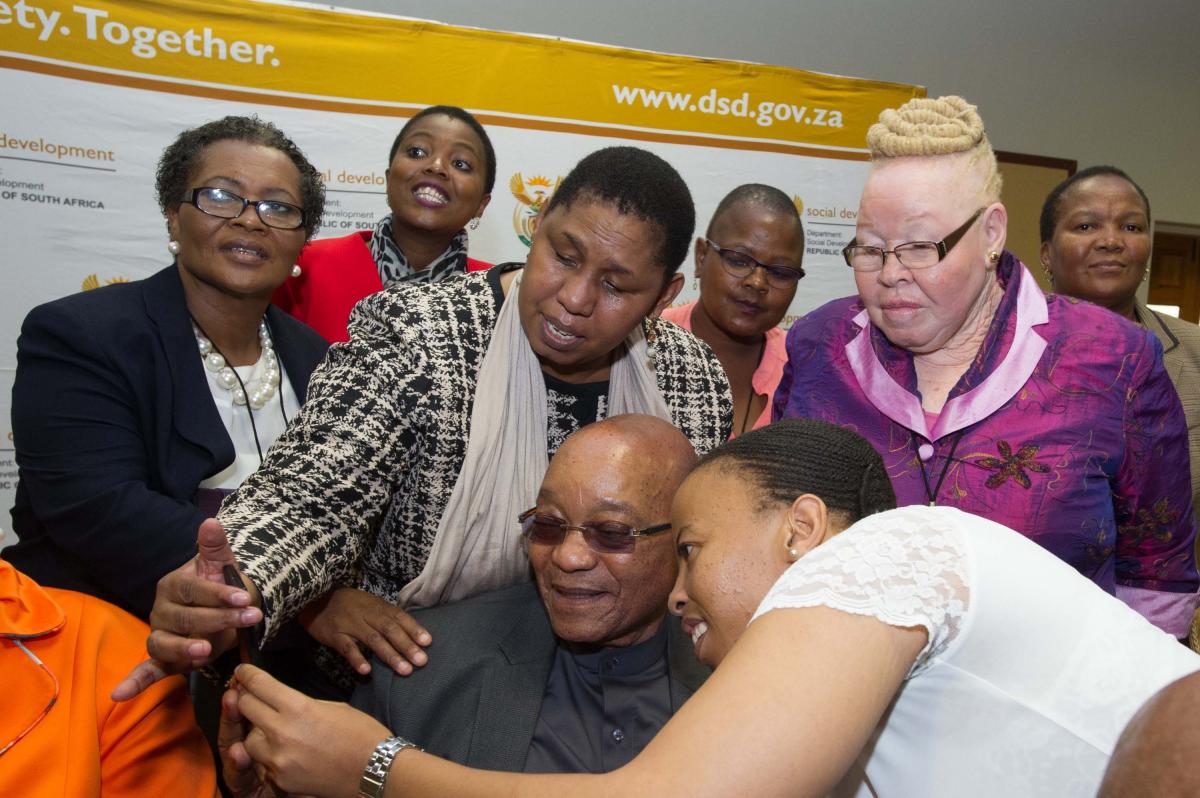
Government and social partners recently wrapped up Human Rights Month 2016, a period we use each year to assess the extent to which we uphold – or possibly compromise – the fundamental rights of citizens.
Human Rights Month transports us vividly to the adoption of the Freedom Charter in 1955 and forces us to look ahead to the attainment of our National Development Plan’s Vision 2030 which anticipates our triumph over poverty, unemployment and inequality.
In Human Rights Month 2016, it was a particular honour for me to convene the first meeting of the Presidential Working Group on Disability.
This Working Group brings together government in partnership with other sectors of our society to mainstream the rights and development of people with disabilities throughout all legislation, policies and programmes.
Persons with disabilities have a proud history of human rights struggle for liberation in South Africa, and it remains our duty to this day to end the discrimination, marginalisation and exclusion of persons with disabilities experienced under apartheid.
The Working Group’s leadership of this effort is aimed at unearthing and unleashing the full human potential of people with disabilities across various categories.
The 2011 Census indicated that, subject to various complex factors, the prevalence of disability across the country stood at 7,5 percent, entailing approximately 2,7 million persons – roughly equivalent to the total population of the Free State, based on Statistics South Africa’s Mid-Year Population Estimate for 2014.
This makes people with disabilities a significant, critical component of our society, and one whose welfare – or disadvantage – is either a positive indicator or an indictment of the way in which our country is developing.
Our progress in this regard is and has been steady.
The percentage of five-year-old children with disabilities attending educational institutions is at 83 percent while the percentage of seven to 15-year-old children with disabilities attending educational institutions is at 93 percent.
The Department of Basic Education has committed to ensuring that a continuum of support services will be available for all children who experience barriers to learning, including those with 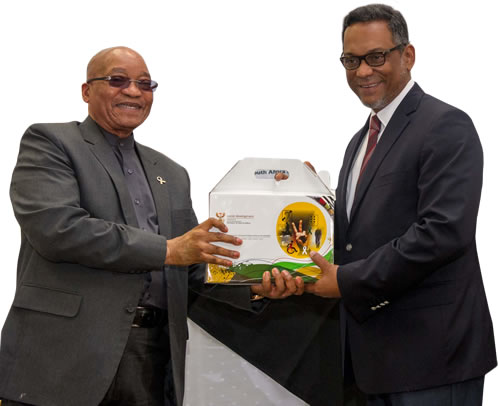 disabilities.
disabilities.
Our goal as government is to ensure that by 2021, no children with disabilities will be out of school. They should all be able to attend their local neighbouring schools and receive the necessary support.
Government has also made progress with regards to the introduction of the South African Sign Language curriculum at school level from January 2015.
At a higher education level, the Ministry of Higher Education and Training, working in collaboration with the disability sector, continues to promote access to post school education and training for young persons with disabilities, needs our support.
More than 6 850 students with disa-bilities have been enrolled at higher education institutions, while more than 2 800 have been enrolled at TVET Colleges in 2014.
Government has also prioritised access to social assistance for persons with disability in need.
Social grants do not meet all the needs of current recipients. However, they go a long way in contributing toward household income equity for persons with disabilities and their families.
In terms of our 2016/17 Budget, overall expenditure on social assistance will increase from R129 billion this year to R165 billion in 2018/19.
The old age, disability and care dependency grants will rise by R80 to R1 500 this month (April), and by a further R10 to R1 510 in October.
The child support grant will also rise by R20 to R350 this month and the foster care grant by R30 to R890.
In 2016, our care, support and compassion is inspired and directed by the 61-year-old Freedom Charter whose clause declaring “there shall be houses, security and comfort” says “the aged, the orphans, the disabled and the sick shall be cared for by the state”.
It is up to all South Africans to recognise the value of creating a truly enabling environment for people with disability who are, thanks to the policies and actions of our democratic dispensation, are making ever-increasing, important contributions to our economy and society.
From the sports arena and the arts to small business, big business and cutting-edge science, South Africans with disability are helping to move all South Africans – include people without disability – forward.
At a time that we are all called upon to be cautious but also creative and brave to grow our economy, we must not allow rands, cents, dollars, ratings agencies or growth forecasts to overshadow or undermine our values of Ubuntu, or destroy the soul of our caring, compassionate nation.
Keep caring. Keep sharing.
Edamame beans to help fight poverty
Edamame beans to help fight poverty JoyLocal government
Following the successful piloting of the effectiveness of the prime protein soya bean project by Edamame Development Programme in Mariannhill, KwaZulu-Natal (KZN), experts have recommended that the programme be rolled out to other parts of eThekwini and the province to fight poverty and unemployment.
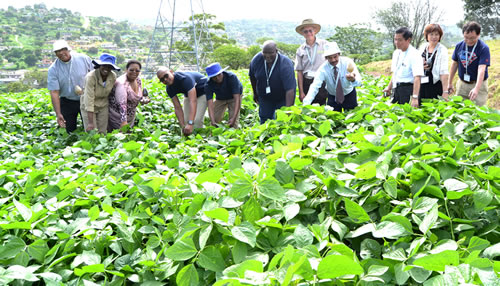 This emerged during the first ever Edamame Agribusiness and Food Nutrition seminar, which took place at the Inkosi Albert Luthuli International Convention Centre recently.
This emerged during the first ever Edamame Agribusiness and Food Nutrition seminar, which took place at the Inkosi Albert Luthuli International Convention Centre recently.
The seminar did not only highlight the impact that the plant will have in growing the city's economy but looked into the many advantages of this prime protein soya bean, which has been predicted to become a staple food in many Durban households in the near future.
Leading international, local and government experts who attended the seminar promoted the effectiveness of the plant and its possible impact to relieve unemployment and poverty challenges.
Deputy Mayor Nomvuzo Shabalala said overseeing eThekwini's Economic Development and Planning Committee means it is her task to drive various programmes to fight the challenges of poverty and unemployment.
“After years of survey we are glad that the researchers are now confident that our province can grow this type of bean and that it can also do well in the market,” added Shabalala.
She said an estimated 4 432 employment opportunities would be created and approximately 3 625 people trained as part of the project.
Shabalala said she was optimistic that the programme would be successful because it is a tripartite partnership between the city, private sector and religious sector since the land was donated by Roman Catholic based in Marianhill.
“This is a true definition of what we always preach, a public and private healthy working relationship to speedily drive service delivery.”
Director of Asian Vegetable Research and Development Centre Dr Sundar Shanmugasundarum, who was a keynote speaker at the forum, presented on why South Africa needs a large seeded vegetable soybean industry.
He said large seeded vegetable soyabeans are environmentally friendly and a major source of protein instead of meat.
"It has a potential to reduce the risk of many diseases such as heart disease, cancer and many more which is why I am happy to see this programme making progress in this country. It has a potential to sustain soil productivity, improve human nutrition, promote rural employment and provide additional income to struggling farmers amongst many advantages,” he added.
Dr Shanmugasundarum added that this is now a popular human food in various countries such as Japan, Korea, Indonesia, China, Taiwan, Nepal and Hong Kong.
In some of these countries young leaves of soyabean are used as food in various forms and as medicine.
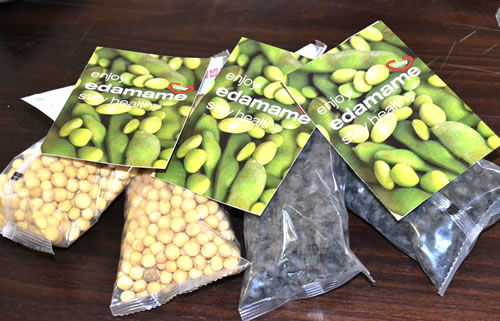 “This will be beneficial to South Africa as it provides an opportunity of exchanging knowledge and ideas and sourcing key tips from these countries who have successfully introduced the product such as how they can transplant and improve the production technology, study the value chain and reduce the cost, invest in continuous research and development and establish a viable domestic market,” he explained.
“This will be beneficial to South Africa as it provides an opportunity of exchanging knowledge and ideas and sourcing key tips from these countries who have successfully introduced the product such as how they can transplant and improve the production technology, study the value chain and reduce the cost, invest in continuous research and development and establish a viable domestic market,” he explained.
Professor Walter Veith of the University of the Western Cape Medical BioScience echoed similar sentiments, adding the Edamame programme had been successfully piloted in KZN.
“This will be a good opportunity for our country to meet national demand and compete internationally which will result in export opportunities. This will benefit emerging growers and improve nutrition and food security for vulnerable communities through informal small grower initiatives,” added Professor Veith.
*Nonduduzo Ngcongo works for the eThekwini Municipality.
Ekurhuleni invests R14 million to train firefighters
Ekurhuleni invests R14 million to train firefighters JoyLocal government
Ekurhuleni Mayor Mondli Gungubele has announced the roll out of the Fire and Rescue Operations Learnership Programme where those who want to pursue a career in emergency services will undergo training.
The launch marked the beginning of an aspiring firefighter’s journey, as the first 50 young people were sworn into the learnership programme through which they will be trained in a range of foundational NQF Level 4 Fire and Rescue competencies.
The City of Ekurhuleni is investing
R14 million over the next two years towards this programme. This will cover the students’ uniform, training material, training fees and stipends.
This first intake of 50 will be followed by another three intakes of 50 candidates in June, December and January 2017. In total, 200 candidates will be trained.
The training will last for 12 months and once completed, the students will be competent in firefighting, rescue operations, victim care, care of the environment and the protection of property as set by the South African Qualifications Authority (SAQA).
For many like 30 year-old Kholofelo Rampedi (30) this programme is the break that she needed after years of applying for skills development opportunities.
“I was on the verge of giving up. I had even forgot I had applied when I received the call to come for physical evaluations. I’m truly grateful for this opportunity because I will now at least have a useful skill to add to my CV after completing this programme,” said Rampedi.
Mayor Gungubele encouraged the learners to make the most of this opportunity, as the training they would undergo would equip them with the essential skills needed when seeking employment.
“These are our humble steps to eradicate unemployment, poverty and inequality. We are not giving you fish because that is not sustainable, instead we are teaching you how to fish so you can go out there and start fishing to feed your families,” said Mayor Gungubele.
He also emphasised that the training did not mean that the learners would ultimately work for the municipality, but improve their employability in the fire and rescue field, wherever the opportunities exist.
Source: The City of Ekurhuleni
Register to vote
Register to vote nthabi
Feeding South Africa's learners
Feeding South Africa's learners nthabiThe National School Nutrition Programme (NSNP) has provided meals to more than 21 000 schools across the country.
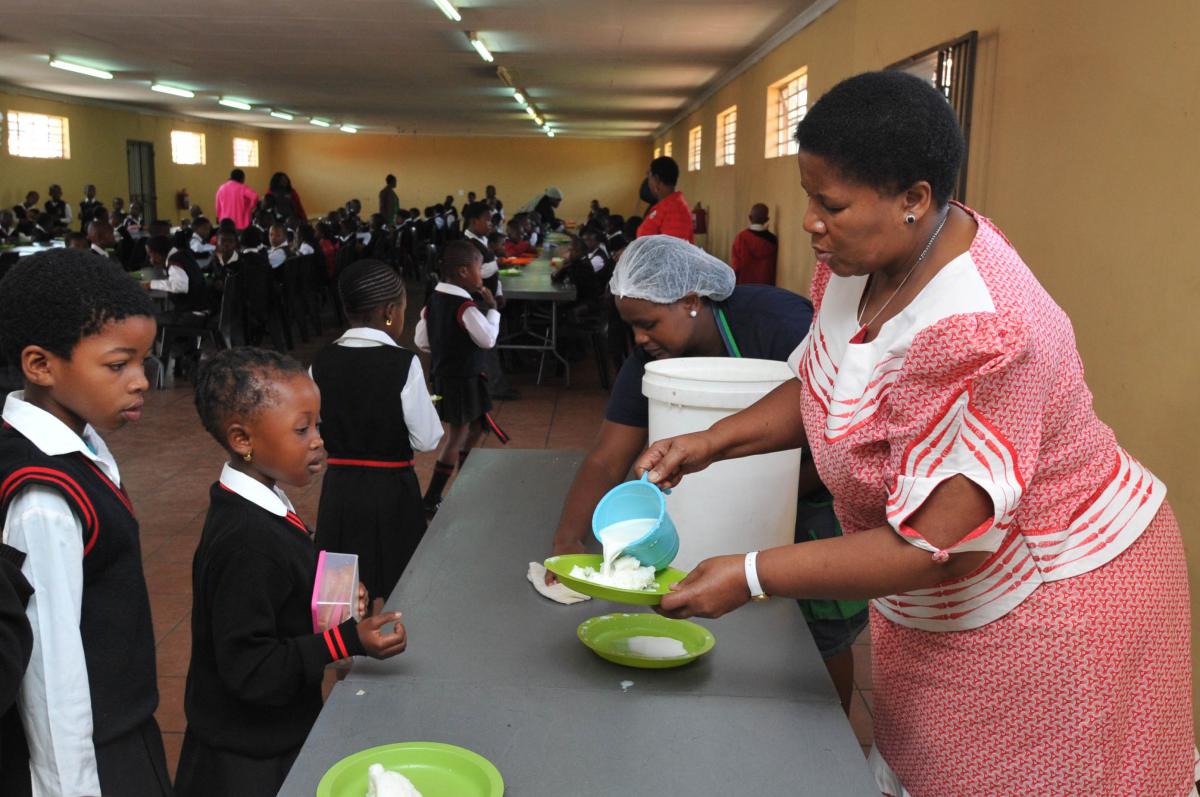 The NSNP is a programme of the Department of Basic Education (DBE) and it reaches over nine million learners across the country.
The NSNP is a programme of the Department of Basic Education (DBE) and it reaches over nine million learners across the country.
Initiated in 1994, the programme aims to provide meals to learners during school hours to help improve concentration and learning.
For the 2015/16 financial year, the programme set a target of reaching 19 800 schools nationally. The schools that are targeted are quintile one to three public primary and secondary schools, as well as identified special schools.
DBE’s Director of the NSNP, Neo Rakwena, said the programme is not only about providing meals but also teaching nutrition education.
She added that the DBE aims to promote a sustainable and efficient school-feeding programme.
“This will ensure the continued provision of daily nutritious meals, as well as the effective implementation of the programme at all levels. To achieve this, capacity-building workshops on financial management, sustainable food production, meal preparation and planning are continuously conducted.”
These workshops target district officials, NSNP coordinators, gardeners and volunteer food handlers.
Through the programme, some of the schools run the School Food Garden Programme (SFGP) to promote healthy living among learners and the community.
“The SFGP deals with promoting the development of school food gardens for teaching and learning whilst supplementing the NSNP menu,” said Rakwena.
Mogobeng Primary School
Vuk’uzenzele visited Mogobeng Primary School in Katlehong, east of Johannesburg, which is successfully implementing the NSNP and provides meals to 1 308 children daily.
Learners who attend the no-fee school come from informal settlements such as Mandela and Holomisa, as well as Nhlapo section, which is a township in Katlehong.
The NSNP has taken off since its implementation at the school in 2000. Mateta Marokoane, the school principal, said the children get two meals a day, cornflakes with milk for breakfast and lunch which could include vegetables, rice, pap, chicken, mince and sour milk.
“Since the NSNP was started in the school, our children do not come to school late because they all know that they need to have breakfast at 7:30am.
“The concentration of the learners has improved, bullying has completely stopped and the pass rate has risen.”
Before receiving assistance from government, Marokoane, who has been principal of the school since 1997, decided to team up with the educators at her school to provide meals for learners out of their own pockets.
“We used to have children fainting during school hours because they were hungry. We thought that it was not right to teach hungry children and started providing meals for the children out of our own pockets,” she said.
Since implementing the programme, the school continues to do well and, in fact, won the NSNP Best School Award.
The purpose of the awards is to showcase excellence in NSNP schools and to document and share good practices with other schools.
Twenty-seven schools are nominated from nine provinces and the best implementer of the programme wins.
Marokoane boasts that her school is known for cleanliness, especially when handling food.
“We have six volunteers at the school who are also parents preparing meals for the learners as food handlers. They get a monthly stipend of R960 from the department.”
Modiehi Nyelimande, who has an eight-year-old son at Mogobeng Primary School, added that not only did the programme help with providing two meals for her child, but it was also a source of income.
“Prior to becoming a food handler at the school, I was unemployed; volunteering at the school has given me an opportunity to provide for my family.”
Marokoane encouraged other school principals to ensure that the NSNP is implemented properly at their schools because “well fed learners produce good results”.
The National School Nutrition Programme in numbers for the 2014/15 financial year:
Eastern Cape
An average of over 1.6 million learners in more than 5 000 schools were provided with meals.
Free State
540 612 learners were provided with meals in 1 134 primary, secondary and special schools.
Gauteng
Nutritious meal were provided to 793 967 learners from 1 390 primary, secondary and special schools.
KwaZulu-Natal
The NSNP reached more than two million learners in 4 948 primary, secondary and special schools.
Limpopo
The department managed to provide nutritious meals to more than one million learners in 3 811 primary, secondary and special schools.
Mpumalanga
The province reached over 800 000 learners in 1 635 primary, secondary and special schools.
Northern Cape
On average, the department provided nutritious meals to 154 800 learners in 354 primary, secondary and special schools.
North West
The department provided nutritious meals to more than 600 000 learners in 1417 primary, secondary and identified special schools.
Western Cape
The department provided more than 400 000 learners at 1027 primary, secondary and identified special schools with nutritious meals.
Learners to be vaccinated
Learners to be vaccinated nthabiOver six million learners from Grade R to Grade Seven will receive vaccinations for soil-transmitted worms as part of the National School Deworming Programme.
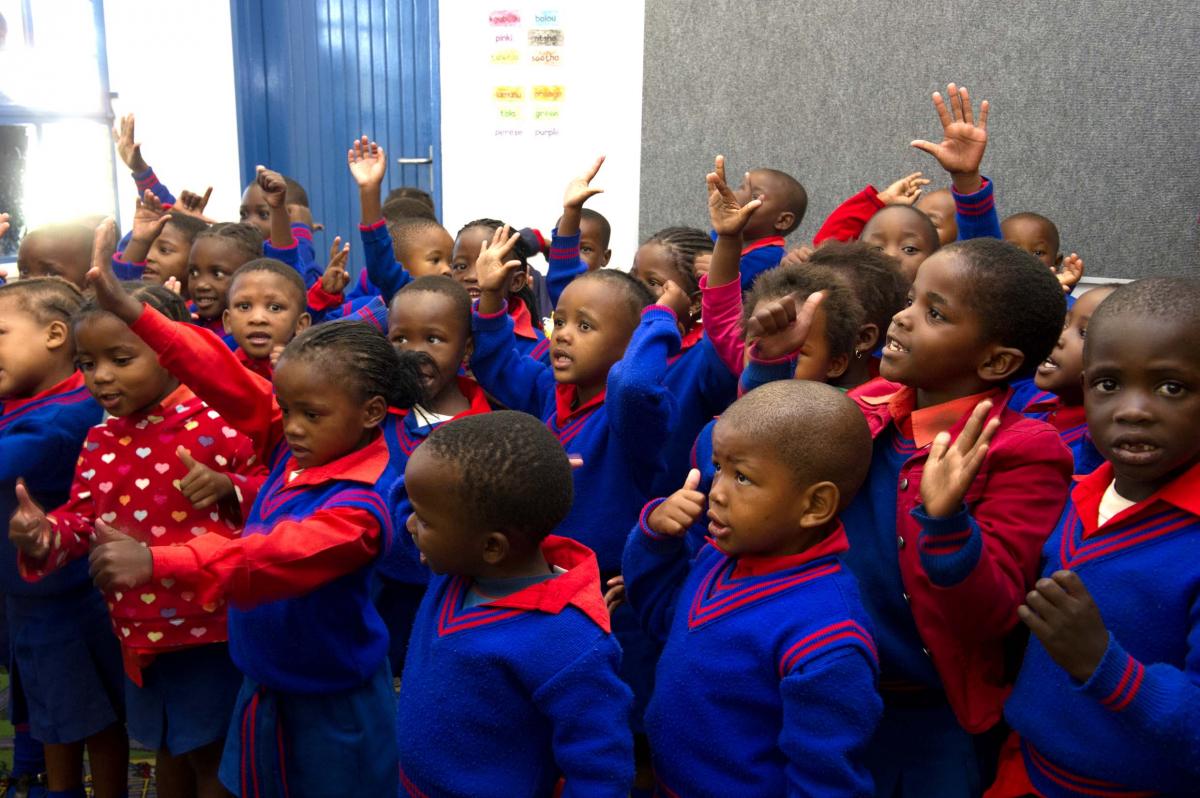 Basic Education Minister Angie Motshekga officially launched the programme at Zimasa Community School in Cape Town recently.
Basic Education Minister Angie Motshekga officially launched the programme at Zimasa Community School in Cape Town recently.
The programme is aimed at primary schools that are quintile one to three.
These schools are part of the Department of Basic Education’s National School Nutrition Programme and the intention is to ensure that learners in disadvantaged areas are healthy.
Infection by worms (soil-transmitted helminths) is widespread throughout the world and millions of people are affected by intestinal worms.
The worms live in the intestines and can cause serious illnesses such as long-term retardation of mental and physical development, reduced scholastic progress and malnutrition due to reduced appetite or poor food absorption. In very severe infections, it may even cause death.
The Minister urged parents to allow children to participate in the programme.
“The National School Deworming Programme is a voluntary exercise aimed at improving the well-being of our learners. I urge all parents and guardians to please sign the consent form and return it to schools.
“Let us all adopt healthy practices in our homes and classrooms across the country. It starts with a habit of hand washing with clean water and soap after every activity, especially before handling food or after visiting the bathroom.”
The aim of the programme is to improve children’s health, reduce health barriers to learning and assist learners to stay in school and receive quality education.
Minister Motshekga said that the launch of the deworming programme was part of the Integrated School Health Programme, which was approved by the Council of Education Ministers with a common goal of supporting learner wellbeing.
“We have adopted a three-pronged approach in accordance with the recommendations of the World Health Organisation (WHO). These include: health education, which includes different types of worms, the way in which transmission takes place, prevention measures that can be taken and integrating hand washing education into the workbooks; regular deworming of children in schools; and the provision of adequate sanitation, safe water and the maintenance thereof to be provided to schools,” she added.
Minister Motshekga also extended her gratitude to all partners for their continued support in ensuring that all South African children receive quality education.
The programme will be implemented in partnership with the departments of Health and Social Development, Johnson & Johnson and the WHO.
Diepsloot gets new police station
Diepsloot gets new police station nthabiThe much-awaited Diepsloot Police Station, situated on the north of Johannesburg, has finally been opened and is expected to crack down on crime in the area.
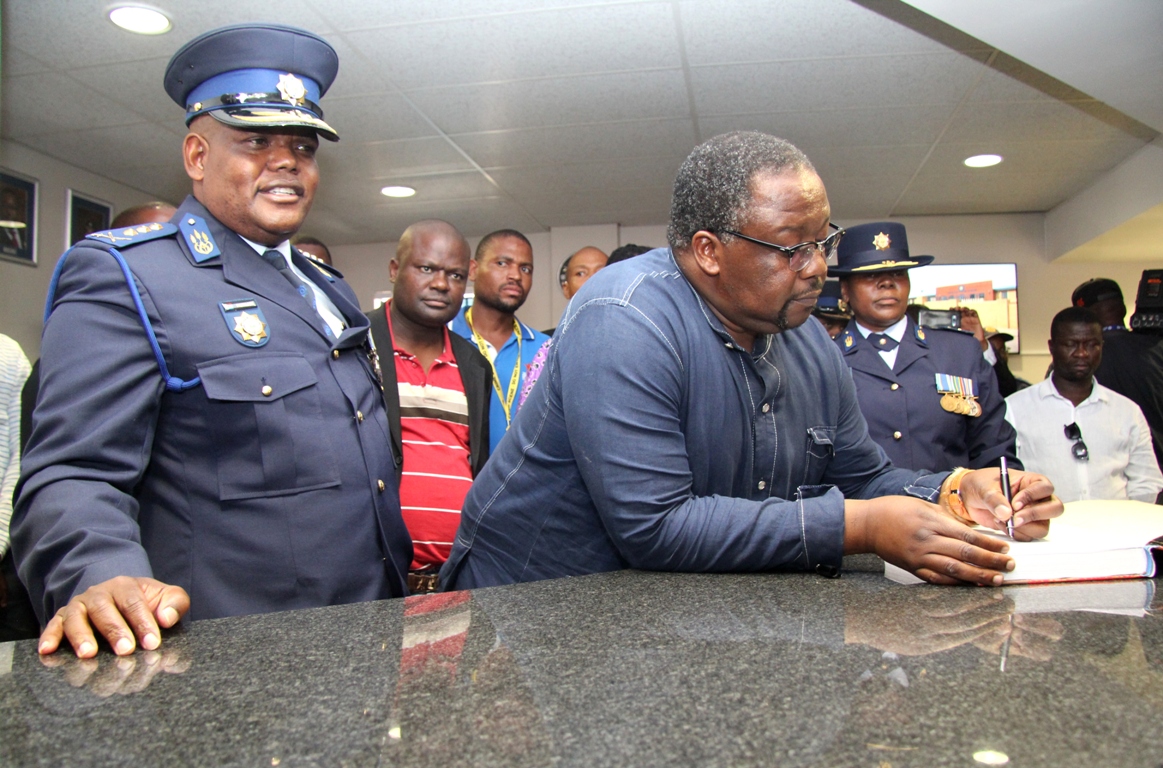 The station was officially opened by Police Minister Nkosinathi Nhleko, who called on the community to protect women and children and use local policing structures to fight crime in their areas.
The station was officially opened by Police Minister Nkosinathi Nhleko, who called on the community to protect women and children and use local policing structures to fight crime in their areas.
“Development comes when there is peace… It is also upon communities to ensure their safety. We should all join hands in the fight against crime,” he said.
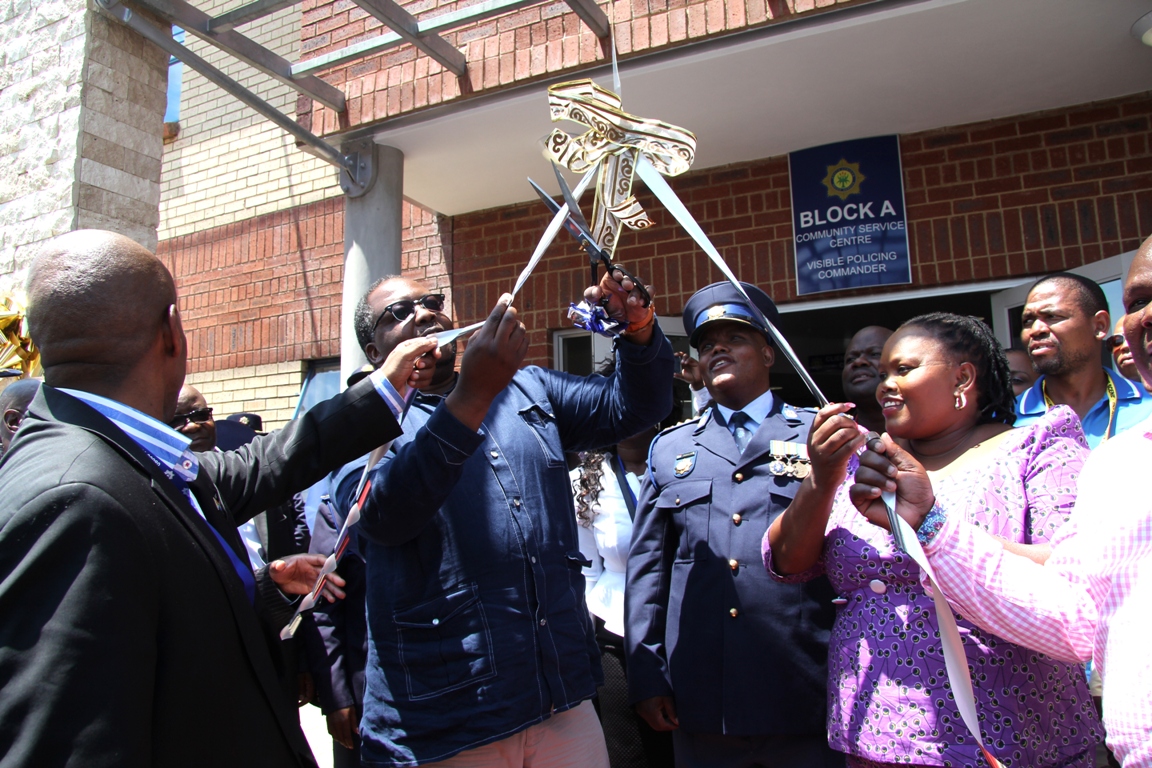 The Minister also handed over 21 new vehicles to the station to further beef-up the fight against crime in the area.
The Minister also handed over 21 new vehicles to the station to further beef-up the fight against crime in the area.
Government spent more than R100 million building the police station, which started in 2008.
The construction created 145 job opportunities for community members who were employed as general workers and 200 youth were trained in different construction fields through the Expanded Public Works Programme and the National Youth Service.
Protecting the people of Diepsloot
Also at the launch was Acting National Police Commissioner Lieutenant-General Johannes Phahlane ,who said a well-functioning police station was important to any community.
“As the SAPS, we are more than delighted to have this facility built for your benefit, so that we can be empowered to serve and protect the people of Diepsloot more efficiently and effectively.
“All the resources that have been placed in this police station will be utilised correctly and fully to fight crime,” he said.
Lieutenant-General Phahlane added that police were accountable to the people they served. He highlighted the importance of a strong partnership between the police and the community.
He said South Africa attracted people of all walks of life who flock into the city of Johannesburg to better their lives.
“People from other provinces and even from our neighbouring countries come to the city of gold, Africa's economic hub.”
“Diepsloot, like many neighbouring communities, has become congested and some people may resort to criminality and alcohol and drug abuse, which is often associated with murder, attempted murder, assault and rape. I must emphasise we will be very firm on fighting such developments.”
He said cracking down on crime, drug lords, corruption and criminals was important.
“We have and will continue to deal with our own members who use our dignified badge to do the opposite of what it stands for. We call upon our community to report any misconduct.”
Jonathan Sathekge a Diepsloot resident who came to witness the official opening of the police station, told Vuk’uzenzele that he feels safer with the completed police station.
“We are grateful for the new police station because it is right on our doorstep and this will scare criminals,” he said.
Frontline service delivery
Since 2014, the SAPS has been on a drive to revamp and restructure police stations through the Frontline Service Delivery (FSD) programme.
“The FSD was implemented by government and is driven by The Presidency to ensure that we honour the Batho Pele principles of putting the people first. In terms of this, not only have we been improving the look and feel of our facilities, but we have also trained our members how to improve their conduct when dealing with people who visit or call our police stations, ” said Lieutenant-General Phahlane
He added the programme was driven to ensure that there is professionalism in the service.
“We have seen the difference. We have made progress in the respective FSD stations that we have already revamped or opened. We have witnessed community accessibility, receptive police service points, the establishment of stakeholder relations and strengthened community relations.”
According to the National Police Commissioner, members of the SAPS who will be serving the community will instil discipline, professionalism, and respect.
“Crime must fall and, together, we must take back the streets so that we can raise our children, who are the leaders of tomorrow, in a safe and better Diepsloot.”
Minister of Public Works Thulas Nxesi, also present at the opening, urged the community to use public facilities responsibly as they are there to serve them.
Fighting crime and corruption
Fighting crime and corruption nthabiPresident Jacob Zuma has announced measures aimed at increasing efforts in the fight against crime and corruption.
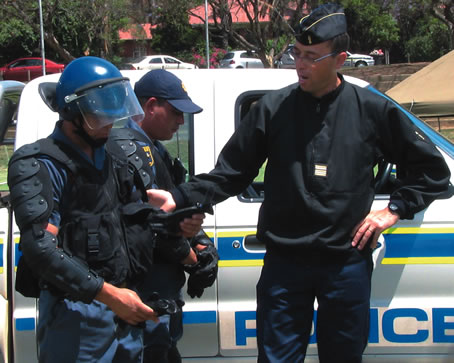 In his response to the debate on the State of the Nation Address, the President said that government is strengthening the legislative framework and is also continuing with other measures to further clamp down on crime and corruption.
In his response to the debate on the State of the Nation Address, the President said that government is strengthening the legislative framework and is also continuing with other measures to further clamp down on crime and corruption.
“The Asset Forfeiture Unit has done a lot of good work in the past financial year,” he noted.
The unit completed 463 asset forfeiture cases worth about R2 billion and also completed 342 freezing orders to the value of R2.8 billion.
“A total of R1.6 billion was paid back to the victims of crime,” said President Zuma. This money was recovered after probing corrupt activities.
The President added that R11 million was recovered in cases where government officials were involved in corruption and other related offences.
He said the Protected Disclosures Amendment Bill was tabled in the National Assembly late last year.
“Its primary objective is to provide protection to whistle blowers so that we can fight corruption better and more effectively.
“The Prevention and Combating of Corrupt Activities Amendment Bill will also be introduced into Parliament,” said President Zuma.
The Bill aims to improve the application of the Prevention and Combating of Corrupt Activities Act in order address practical challenges and close gaps.
Another new law being introduced is the Cyber Crimes and Related Matters Bill, which is scheduled to be introduced into Parliament in the first half of 2016.
Cyber crime can be defined as a criminal activity done using computers and the Internet.
Developments in the South African Police Service
Still on security issues, the President announced two new developments in the South African Police Service.
“As part of the Back to Basics strategy, the Ministry of Police will establish special units to deal with drugs and related transnational crimes as well as violence and the proliferation of firearms in our society.”
The two units, said the President, are the South African Narcotics Enforcement Bureau and the National Bureau for Illegal Firearms Control and Priority Violent Crime.
The units will fall under the Directorate for Priority Crime Investigation, commonly known as the Hawks.
Passion for TB awareness
Passion for TB awareness nthabiZamani Dlamini (33) has a passion for ensuring that his community is healthy.
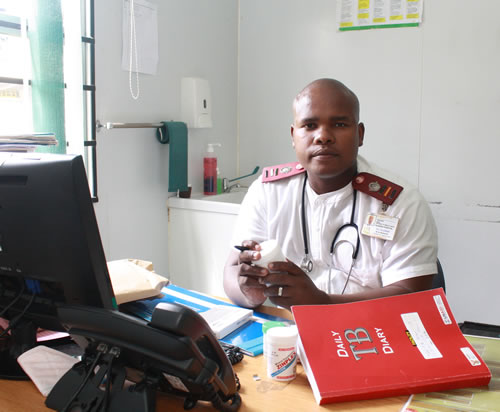 A male nurse by profession, Dlamini is a tuberculosis (TB) advocate and spends his days helping those affected by the disease.
A male nurse by profession, Dlamini is a tuberculosis (TB) advocate and spends his days helping those affected by the disease.
He said he does this so that he can be the light that shines for the people in his rural village of Mpembeni in KwaHlabisa on the north of KwaZulu-Natal.
He is a nurse at Hlabisa Hospital in uMkhanyakude district and also runs the TB programme in this region.
The KwaHlabisa hospital caters for people in Mtubatuba, Hluhluwe and part of Nongoma. The hospital also services 17 clinics and four mobile clinics.
From taxi driver to nurse
Originally from Hlabisa, Dlamini was raised by his grandmother. In 1998, when he was in Grade 11, she was diagnosed with diabetes. It was then that he dreamt of becoming a nurse.
“At the time, I felt that if I was a nurse I would have been in a better position to help my grandmother because I would have had the knowledge of how to care for a diabetic person.”
In 2000, he completed his matric with exemption but his prospects of becoming a nurse were very bleak.
“After completing matric, I sat at home without employment or education for seven years.”
His grandmother passed away in 2002, and he decided to go to Johannesburg to look for a job.
“I worked as a taxi driver. Even while driving a taxi, I had this thing inside of me saying that one day I would become a nurse.
“If I happened to load a nurse into the taxi, I used to become ecstatic because I knew that this was the time for me to find out more about the nursing profession.” He drove a taxi for four years.
Things started to look better for Dlamini in 2007 when he went back to Hlabisa after working in Johannesburg.
“I started visiting the Hlabisa Hospital frequently to find out if there were no opportunities for young people who wanted to be nurses.”
In the same year, he got a scholarship through the Umthombo Youth Fund, which allowed him to enroll at the University of Zululand for a degree in nursing.
In 2012, he completed his studies and started working as a nurse at Hlabisa Hospital.
Educating the community
The TB programme caters for people who receive health services from the 17 clinics and four mobile clinics serviced by Hlabisa Hospital.
“I run the TB programme in all these clinics. I also want to create more awareness about this disease and iron out misconceptions about TB.”
When Dlamini started working as a TB co-ordinator in 2013, he wanted to improve TB awareness.
“I realised that the only way I can do that is to educate people about the disease.”
He started educating enrolled nurses from the clinics that fall under Hlabisa Hospital. He also educated taxi drivers, traditional healers and learners in all schools in the district.
Upon joining the TB programme at Hlabisa, he realised that the cure rate was very low - between 60 and 70 per cent - and the defaulter rate was high.
Providing training for nurses in clinics, teams of community health workers, traditional healers and taxi drivers resulted in the defaulter rate decreasing from 4 percent to 0.5 percent and the cure rate went up from 70 percent to 81 percent in KwaHlabisa.
Dealing with stigma
Dlamini said while raising awareness about this illness he became increasingly aware of the many misconceptions surrounding the disease.
“What I found to be the biggest misconception about TB is its mode of spread. Most people associate TB with HIV, which is very wrong. They say once you have TB, it’s obvious that you are HIV positive.
“This is why some people end up defaulting in taking medication because they are scared of the stigma associated with having TB.”
He added that people in rural areas also have a strong belief in traditional medicine.
“We cannot run away from the fact that people in our country believe in traditional healers. That is why I decided to teach traditional healers about this disease so that they refer people who have TB to the hospital rather than try to heal them.”
Dlamini said he enjoys the work that he does even though working in a rural area is very stressful.
“Professionals working in rural areas must remember that they are often the last hope for their patients. They are also role models to children. We can’t all flock to the city; some of us must stay in far flung areas to help those in need.”
Programme puts male health first
Programme puts male health first nthabiThe Mpumalanga Department of Health is one step closer to achieving its goal of reaching 80 percent of uncircumcised men through its Voluntary Medical Male Circumcision (VMMC) programme.
This was after the department opened a VMMC unit donated by Anova at Matikwane Hospital in Bushbuckridge.
The community of Bushbuckridge is known for sending boys to initiation school as part of a cultural practice.
David Mdluli, chief health director in Ehlanzeni District, under which Bushbuckridge falls, said even though some people in the area prefer to go to initiation school, the brand-new facility is available to those who prefer medical male circumcision.
“The new building must be used by the community. We know that when community members need to be circumcised in Bushbuckridge, they go the traditional route of going to the mountain. However, there are those who prefer medical male circumcision and this facility will cater for them,” said Mdluli.
The primary goal of implementing the VMMC programme is to achieve 80 percent VMMC coverage among uncircumcised, HIV-negative men between the ages of 15 and 49 years by the end of the year.
By increasing the coverage of VMMC in Mpumalanga, the department hopes to reduce the number of new HIV infections and achieve net savings in treatment-related costs.
“The implementation of medical male circumcision is informed by the South African National Strategic Plan for HIV and Aids and STIs 2012 – 2016 which aims to reduce 60 percent of new HIV infections by 2016. Mpumalanga began providing VMMC services as part of a comprehensive HIV prevention strategy in October 2010,” said Mpumalanga Department of Health spokesperson Chistopher Nobela.
Nobela added that studies in other countries have shown that achieving universal coverage of VMMC can greatly reduce the rate of HIV transmission.
“However, existing VMMC programmes in Mpumalanga have encountered significant barriers to achieving the scale-up required to realise public health impact,” Nobela said
Nobela said the implementation of the VMMC programme is done in partnership with five implementing partners allocated per sub-district. Bushbuckridge as a sub-district is supported by Anova Health Institute, which built the Bushbuckridge VMMC unit.
The Anova Health Institute is a non-profit organisation dedicated to improving health with particular emphasis on HIV.
In South Africa, Anova is strengthening and supporting the public healthcare system through technical assistance by providing capacity building, clinical expertise and facilitating health technology expansion.
Last year during his budget vote, Mpumalanga Department of Health MEC Gillion Mashego announced that a total of 54 public health facilities offer VMMC services in the province. Out of 54 facilities, 28 are hospitals and 26 are Primary Health Care facilities.
MEC Mashego said his department’s plan is to continue to work closely with general practitioners and traditional initiation school surgeons to increase access to VMMC services points.
“We are targeting to perform 150 000 circumcisions in the 2015/16 financial year,” Mashego said.
The Department of Health also
acknowledged that the implementation of VMMC cannot be provided as a stand-alone programme but has to be offered as a comprehensive sexual reproductive health package targeting not only men but their partners as well.
MEC lends a helping hand to Nkonkobe community
MEC lends a helping hand to Nkonkobe community andileAn Eastern Cape farmer had to pinch himself to make sure he was not dreaming when he was informed that he and his counterparts would get much-needed assistance from government. Reverend Mzoxolo Mxekeza from Seymour immediately called his wife to share the good news.
“I was so shocked when I heard that I was to be given two Boran bulls, that I phoned my wife immediately to tell her the good news.” The community of Nkonkobe is the latest to get assistance from the Eastern Cape Department of Rural Development and Agrarian Reform.
As part of the department’s efforts to help farmers who have been affected by drought in the province, MEC of Rural Development and Agrarian Reform Mlibo Qoboshiyane donated bulls, goats, sheep, hay, lucerne and mineral licks to farmers from Nkonkobe and Seymour. He donated two Boran bulls, three Boer goat rams and 15 Dohne Merino rams to Siyazama Clains Wool Growers and fodder production equipment to the Hacop Project valued at R900 000.
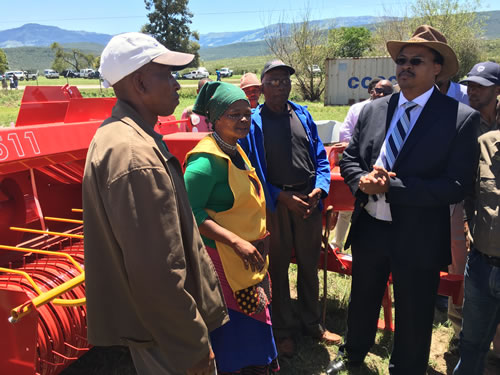
The equipment included one baler, one rake, one cultivator, one mower, lucerne seed for 20 hectares and a diesel pump for an irrigation system. As part of the department’s drought relief intervention, the MEC also donated 10 tons of hay, eight protein and energy mineral licks and seven water tanks.
Working together to deal with the drought
MEC Qoboshiyane said it was important for all stakeholders to work together to deal with the drought. In all the affected districts, the department - in partnership with various stakeholders - has established district joint operations committees to support efforts aimed at helping farmers to deal with the consequences of the drought.
MEC Qoboshiyane said interaction has improved between officials and clients. “Departmental officials are interacting with farmers and clients and are educating them about alternative livestock management.” He added that farmers have also been assisted with water and equipment.
“A total of 400 water tanks and 5 600 000 litres of water have been procured by the department and deliveries have commenced. We are targeting those severely affected districts.” Nohlakaza Papu from Seymour, who is benefitting from a water tank donated by the department, said the help they received from the department would go a long way in assisting small farmers to deal with the drought.
“I feel so happy and grateful to the MEC for the tank. It will bring great change to us as we were battling extreme water shortages. God has answered our prayers. There are no words to explain my joy,” she said.
Training for farmers
In an effort to get young people involved in agriculture, the department decided to improve the agricultural colleges in the province. MEC Qoboshiyane says the department was planning to refurbish the college farm and hostels at Fort Cox College. This would increase the intake of students. The department is also embracing technology, giving students at Tsolo Agricultural College iPads to use for their assignments and to conduct research.
“We are going to have students of competence, not students of attendance,” he says. The MEC added that the colleges would give the students a competitive edge because they would be given a chance to practice what they’ve learned in class in the different community projects of the department.
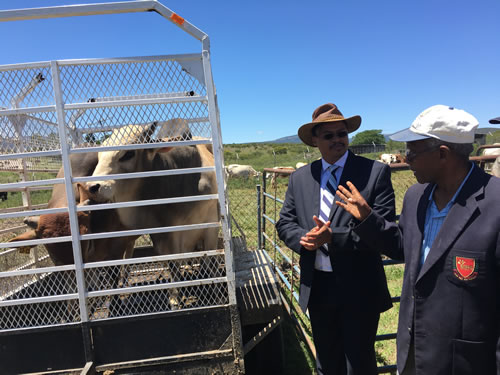
The MEC also opened a training centre aimed at training more farmers in the region. The Mpofu Training Centre will offer training to students in sheep shearing, cattle dipping and other aspects of farming. Students will also attend courses on poultry, beef and sheep management. “There is also hostel accommodation with kitchen facilities for students,” he said, adding that students leaving the institution should be fully equipped in all aspects of livestock nurturing.
Grooming future farmers
Grooming future farmers andileThe lives of young people from KwaZulu-Natal (KZN) who are passionate about farming are being changed for the better, thanks to the Future Farmers Internship Programme.
The internship programme is an initiative started by a female farmer, Judy Steward, in 2007. The programme provides training and skills development to young people in order for them to become commercial farm managers or farmers in their own right. Steward told Vuk’uzenzele that she started this programme to reduce unemployment and to promote farming as a career among young people in KZN. She said through the programme, learners are placed on farms where they work for a period of two years to gain experience.
“They are learning a variety of skills, from the most menial tasks to tractor driving, operating milking machines, control of irrigation systems, dairy herd management and leadership skills. After two years of practical experience, a few learners who excel in their work are selected to do a one-year internship overseas. We have already placed 36 learners in Europe, Australia and United States of America,” she said.
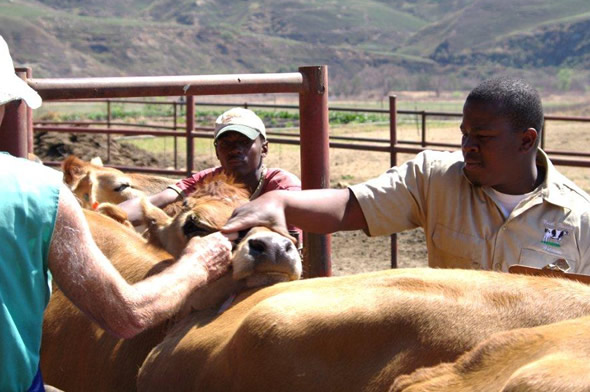 Steward said in these countries learners are equipped with skills to manage large farms. When they come back home, they are employed in the agricultural sector as farm managers. “The basic requirements are a matric certificate, the ability to speak English, they must have worked in the farming industry for at least two years and be between the ages 18-26 in order to to qualify for a visa to go overseas,” she said. One of the beneficiaries of this programme, who is a mentor for Future Farmers, Mzwandile Duma (29) said being part of the programme opened doors of employment for him.
Steward said in these countries learners are equipped with skills to manage large farms. When they come back home, they are employed in the agricultural sector as farm managers. “The basic requirements are a matric certificate, the ability to speak English, they must have worked in the farming industry for at least two years and be between the ages 18-26 in order to to qualify for a visa to go overseas,” she said. One of the beneficiaries of this programme, who is a mentor for Future Farmers, Mzwandile Duma (29) said being part of the programme opened doors of employment for him.
“I only had matric that I obtained at Zakhe Agricultural College. After matric, I was sitting at home because I didn’t have money to go to a tertiary institution. When I heard about the programme, I was very reluctant because I didn't think that Future Farmers would consider my application because of my disadvantaged background. But here I am. I made it,” said Duma. After his two-year training, Duma was placed on a farm in the US for further training and development.
“I was at North Florida Hole Holstein Farm in America. I studied pasture management, dairy management, animal health and other courses. When I came back I didn’t have to look for a job – I was headhunted. I’m now working as a provincial organic manager. I encourage young people to grab opportunities like this because they are very rare to find,” he said.
Duma is also working as ambassador for Future Farmers. “I mentor learners that are selected to go overseas on how they should handle themselves when they get there. “This is very important because if you go there and mess up, you are automatically closing doors for those behind you. Farmers overseas have a full right to say we don’t want students from South Africa anymore because they do not want to work,” he said.
Steward said that people who have not had any farm experience may still apply. “They will be placed on farms and be monitored for two years before they can go overseas. The reason why you have to work on a farm first, is because you will need references to go and also we need to send people with passion. If you are working on a farm, it is easy for us to see if you have passion for what you do or if you are just there for the money,” she said.
For more information on Future Farmers, visit the office in Howick, KwaZulu-Natal, or call 033 330 4322.
Register on CSD or lose business
Register on CSD or lose business andileNew and existing companies doing business with government have until 31 March to register on the Central Supplier Database (CSD). This is according to National Treasury, which launched the CSD to have a central source of suppliers for all spheres of government.
The total cost of the establishment of the CSD was R9 million. The purpose of centralising government’s supplier database is to simplify processes and reduce cost for both supplier and government, while enabling electronic procurement processes. From the 1 April 2016 only suppliers registered on the CSD that are compliant will continue to do business with government.
Simplifying supply chain
National Treasury said that the CSD is the first step towards simplifying fragmented supply chain management in government and will help bring down the rate of corruption. Currently there is no single consolidated comprehensive supplier database and as a result, information related to the compliance requirements of government is duplicated during procurement processes.

Suppliers that are in good standing on the various compliance requirements of government will experience a reduction in red tape and administrative burden when doing business with government. The CSD forms part of the modernisation of supply chain management in government and will contribute to National Treasury’s objectives of establishing a public procurement system that is fair, equitable, transparent, competitive and cost effective.
A quick and easy process
Sam Bradley, who regularly does business with government as a travel and adventure writer, says his experience of registering on the CSD was quick and efficient. He said it took about 30 minutes for all of his information to be loaded onto the database and he received assistance from the technical team, which was friendly and effective. “The system made it look pretty easy to manage.” He advised suppliers registering on the database to have bank details, tax number and information relating to the directors and owners of the their companies on hand.
Steps to follow when registering
- For a supplier to register on the CSD, a valid email address, identity number, cellphone number and bank account details are mandatory.
- When registering on the system, suppliers must produce tax information and commodities that they can supply, among other things.
- Suppliers can capture and update their information at any time in preparation for the use of supplier data, through procurement and financial systems used by all organs of state, from 1 April 2016.
- Once suppliers have registered on the CSD and their information has been verified, a unique supplier number and security code will be allocated to them.
- In addition, suppliers will only be required to register once when they do business with government.
For more information contact the National Treasury: csd@treasury.gov.za or 012 406 9222. csd@treasury.gov.za or 012 406 9222.
R1 billion for drought relief
R1 billion for drought relief andileThe Deputy Minister of Agriculture, Fisheries and Forestry, Bheki Cele, says a package of just under R1 billion has been set up to assist farmers who are affected by drought in several provinces. The Deputy Minister, who was speaking during a debate of President Zuma’s State of the Nation Address (SoNA), in Parliament recently, also said more relief is being given to farmers as drought has dried up reserves, leaving crops and livestock vulnerable.
“All provinces are under constant assessment and further declaration has been and will continue to be made as the assessments are concluded. It is important to note that other mitigating and risk reduction programmes of government are continuing."
“A total package of just under R1 billion has been approved in addition to the R124 million allocated by provinces to assist the affected farmers with livestock feeds and livestock water,” he said.
During his State of the Nation Address (SoNA), the President emphasised the importance of Agriculture, Forestry and Fisheries as he gave feedback on the Nine-Point Plan, with specific focus on the revitalisation of agriculture and agro-processing value chains and the Ocean Economy.
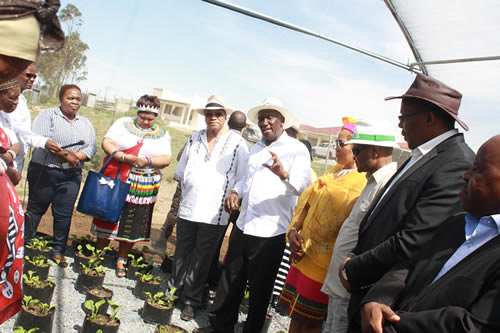
The President said five provinces have been seriously affected by drought and government has provided relief to the affected communities. Collectively, the Agriculture, Forestry and Fisheries sector contributes over R70 billion to the South African economy. Deputy Minister Cele said the drought is threatening the national priorities linked to food security, job security and the economic growth.
He said that just over 9.2 million cattle, goat and sheep in all provinces have so far benefited from government interventions. Additional funding is being requested from National Treasury through the Inter-Ministerial Committee to extend the assistance, the Deputy Minister said. He added that government has also established feedlot areas in provinces such as KwaZulu-Natal. “We are engaging the Industrial Development Corporation and the Land Bank, who have already made available over R100 million to assist farmers, with credit facilities related to drought.”
Eradicating hunger, malnutrition
The Deputy Minister saidthat the current situation calls for coordinated food security interventions. “Government has centralised the establishment of a national food security implementation framework in the office of the Deputy President,” he added.
“Government has also approved Agriculture Phakisa project [Operation Phakisa Agriculture and Rural Development] aimed at fast tracking targeted planning towards the achievement of the National Development Plan targets on agriculture and rural development targets.”
R7bn set aside for new port facilities
R7bn set aside for new port facilities andileSouth Africa’s oceans economy has been on a growth trajectory since the launch of Operation Phakisa.
 Government recently announced that it has allocated R7 billion to Transnet National Ports Authority so that it can build new port facilities to expand South Africa’s ocean economy.
Government recently announced that it has allocated R7 billion to Transnet National Ports Authority so that it can build new port facilities to expand South Africa’s ocean economy.
Operation Phakisa aims to implement policies and programmes faster and more effectively to make inroads into the ocean economy. It is also one of the job drivers in the Nine-Point Plan that aims to grow the economy, create jobs, transform the economy and attract investment.
Two hundred jobs have already been created in new port facilities. Over the last 12 months, existing ports were refurbished and maintained, the Economic Cluster as well as the Employment and Infrastructure Development cluster said recently. The cluster, which is chaired by Rural Development and Land Reform Minister Gugile Nkwinti, said work to grow the ocean economy is gaining momentum.
“Through the public-private partnership to establish Saldanha Bay as an oil and gas hub, an investment of R9.2 billion has been realised, which will be utilised over the next five years. With 14 licences issued for oil and gas exploration, drilling of two exploration wells for potential oil and gas finds will take place along the South African coast. The investment in gas infrastructure has commenced and will contribute to the energy security,” said the cluster.
Work on the offshore supply base has already started. It will see Saldanha Bay attracting oil rigs for maintenance and repair. This will create secondary job opportunities for surrounding communities.
According to the cluster, the boat building sector has been revitalised, leading to 500 direct jobs and 3 000 indirect jobs. “An amount of R353 million over the next three years has already been unlocked in the ports of Durban and Cape Town for boat building infrastructure through incentives provided by government.
“Further investments in boat building - catamaran production, workboat ferries for the navy, two offshore mining vessels and tugboats for the ports authority - and a fuel storage facility amount to approximately R3.6 billion,” the Economic Cluster said.
For the 2016/17 financial year, R80 million has been allocated for the rehabilitation and maintenance of proclaimed harbours in Gansbaai, Saldanha Bay, Struisbaai, Gordons Bay and Lamberts Bay, as well as the establishment of three new harbours in Boegoebaai in the Northern Cape, Port St Johns in the Eastern Cape and Hibberdene in KwaZulu-Natal. This will provide opportunities for local and rural economic development.
South Africa’s 3 924 km coastline is bordered by two oceans on three sides – east, south and west. According to research, the oceans economy could contribute up to R177 billion to the gross domestic product (GDP) and create just over 1 million jobs by 2033.
Growing the aquaculture sector
The aquaculture sector has unlocked investments of more than R400 million across 10 aquaculture farms which are already in production.
The community of Hamburg in the Eastern Cape has seen its first harvest of dusky kob (kabeljou) and the Siyazama Aquaculture Cooperative in Hamburg has sold its first harvest of dusky kob to the Cape Town Fish Market at the V&A Waterfront in Cape Town.
The cluster said the expansion of aquaculture projects to inland and other coastal areas in support of Small Medium and Micro Enterprises will create 3 200 jobs and contribute R500 million to the GDP over the next year. The first two bulk carrier vessels have been registered in Port Elizabeth, and a third tanker in Cape Town, providing opportunities for South African cadets (trainees) boarding these vessels.
Statistics South Africa ready for Community Survey 2016
Statistics South Africa ready for Community Survey 2016 andileMinister in The Presidency Jeff Radebe, and the Statistician-General, Pali Lehohla, recently launched the Community Survey 2016 (CS 2016) in Mamelodi, east of Pretoria.
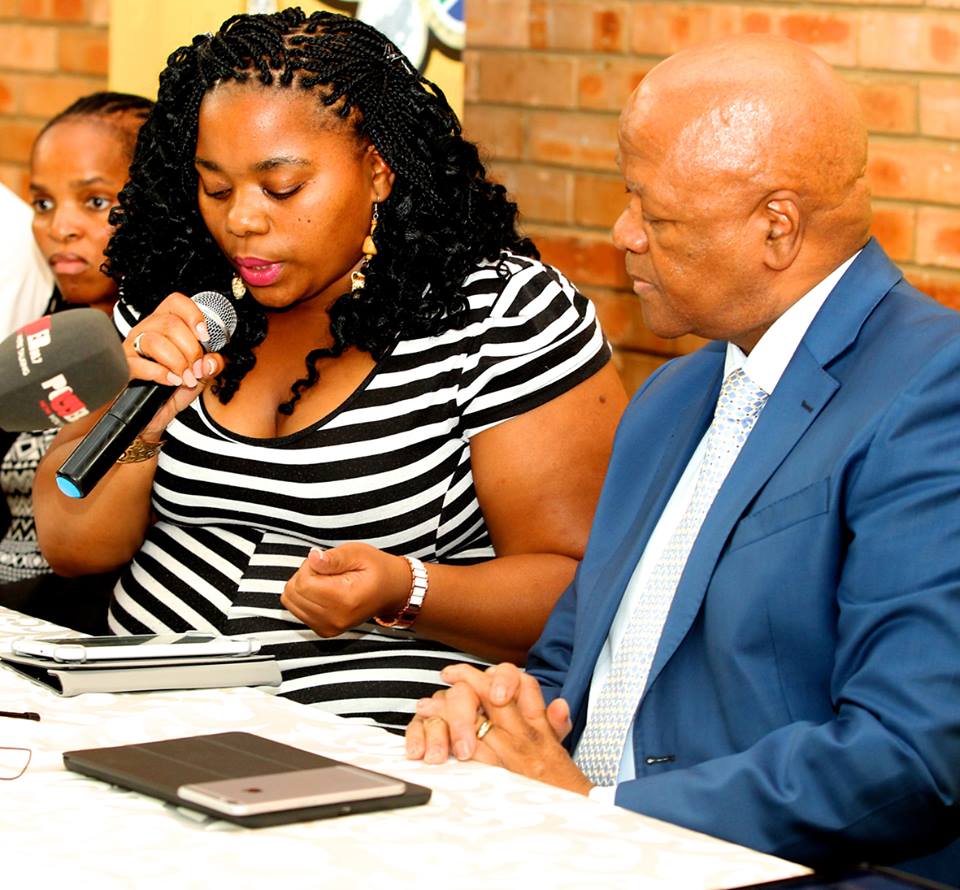 The CS is a large-scale household survey conducted by Statistics South Africa (Stats SA) to bridge the gap between censuses. Its purpose is to collect information that will assist government and the private sector in planning, evaluating and monitoring programmes and policies.
The CS is a large-scale household survey conducted by Statistics South Africa (Stats SA) to bridge the gap between censuses. Its purpose is to collect information that will assist government and the private sector in planning, evaluating and monitoring programmes and policies.
The CS, which will run over a six-week period, will provide official statistics on living conditions which include water, electricity, sanitation as well as education levels and employment at municipal level.
The launch was held at one of the 330 training venues where Stats SA is training more than 10 000 contract staff who will be collecting information from more than 1.3 million households in every area of the country from 7 March to 22 April.
Minister Radebe said the Community Survey is bigger than any project Stats SA conducts outside of the census. In the 2007 Community Survey, 300 000 dwellings were sampled. This year, CS 2016 will visit more than 1.3 million households.
The CS 2016 will use the Computer Assisted Paper Interview (CAPI) methodology to collect data digitally instead of the traditional paper method. The new technology has reduced the cost of the survey from an average of R2 000 per household for a paper-based survey to just R200.
The other benefits of using the new digital device include an improvement in the quality of the data collected because of inbuilt controls in the electronic questionnaire. Also, the use of geographic navigation capabilities will ensure that fieldworkers enumerate houses that have been selected.
Using CAPI also greatly reduces the amount of time it takes to release results once the survey has been completed. During Census 2011 results were released a year after the collection of data had been completed. This year the CS 2016 results will be released by the end of June 2016, just two months after the completion of data collection.
This improvement in turnaround time bodes well for the upcoming local government elections because citizens will be treated to objective data that talks to what has been delivered and what remains to be done. Also, citizens will be able to make decisions based on this helpful body of evidence. More importantly, they will know what they as citizens have to do in order to change their lives.
It also means that local municipalities will have the ability to draw up plans based on data that is current and not outdated. The speed with which the data will be delivered can contribute to deepening the country’s democracy.
Municipalities will have to deliver to constituencies that can hold them to account because of the almost instantaneous availability of the new data.
Statistics should be embraced as a fundamental part of our democracy. It should be viewed as a conduit of trust amongst citizens and amongst nations. Statistics can help to improve the quality of democratic debate, by providing reliable indicators which are vital for decision-making.
The Minister called on all South Africans to rally behind the yellow team, Stats SA, as it begins the survey across the country to gather statistics for our nation. Open up your doors and allow the team to come in. South Africa counts because you count.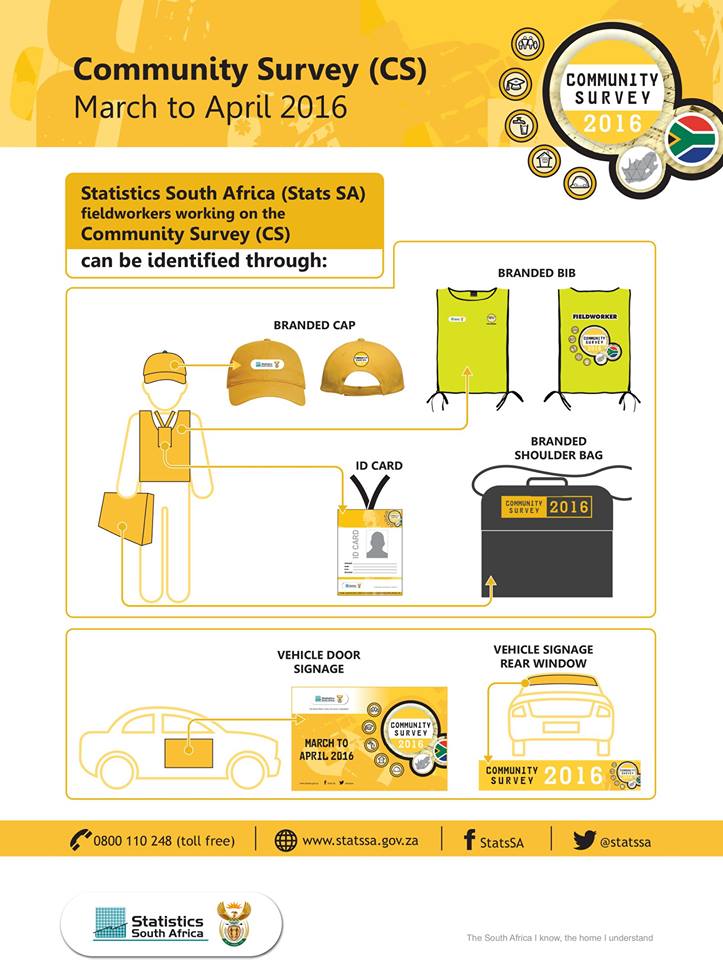
*Compiled by Statistics South Africa
For more information on the survey please contact the call centre on 0800 110 248.
Jobs: Justice and Constitutional Development - Apr 2016 (1)
Jobs: Justice and Constitutional Development - Apr 2016 (1) andileDirector: Human Resources (re-advertisement)
Reference: 2016/67/GP
Package: R864 177 – R1 017 972 per annum (All inclusive). The successful candidate will be required to sign a performance agreement.
Requirements: An undergraduate qualification (NQF level 7) as recognized by SAQA; At least 6-10 years human resources experience of which 6 years must be at middle/senior management level; A valid driver’s licence
Enquiries: Ms E Dhlamini (011) 332 9000
Senior Assistant State Attorney LP5 - LP6 (3 posts)
Reference: 16/61/SA
Salary: R392 739 – R926 586 per annum. (Salary will be in accordance with OSD determination). The successful candidate will be required to sign a performance agreement.
Requirements: LLB or 4 year recognized legal qualification; Admission as an Attorney; At least 8 years appropriate post qualification legal/litigation experience; Right of appearance in the High Court of South Africa; A thorough knowledge of legal practice, office management, accounting systems and trust accounts; Understanding of the State’s policies and transformation objective as well as the Constitution of South Africa; A valid driver’s licence.
Enquiries: Ms. K. Ngomani (012) 357 8661
Senior Assistant State Attorney LP5 - LP6
Reference: 16/56/SA
Salary: R392739 – R926 586 per annum. (Salary will be in accordance with OSD determination). The successful candidate will be required to sign a performance agreement.
Requirements: An LLB or 4 years recognized legal qualification; Admission as an Attorney; The right of appearance in the High Court of South Africa will be an added advantage; At least 4 years appropriate post qualification legal/litigation experience; Conveyancing experience will be an added advantage; A valid driver’s licence.
Enquiries: Mr. E. Seerane (012) 315 1780
Court Manager
Reference: 16/49/KZN
Salary: R361 659 – R426 009 per annum. The successful candidate will be required to sign a performance agreement.
Requirements: A 3 year qualification in Administration and/or a National Diploma in Services Management (NQF level 5) plus the module in Case Flow Management or equivalent qualification; At least 3 years’ managerial or supervisory experience; Knowledge and experience in office and district administration; Knowledge of the financial management and PFMA; Experience in managing Trust (Third Party Funds) and Vote Account; Experience in the Court environment will be an added advantage; A valid drivers’ licence.
Enquiries: Mr J.N. Mdaka (031) 372 3000
Assistant Director: Administration and Auxiliary Services
Reference: 16/36/FS
Salary: R289 761 - R341 313 per annum. The successful candidate will be required to sign a performance agreement.
Requirements: B Degree or National Diploma in Public Management / Administration and/or equivalent; (Three) 3 years’ experience with at least (One) 1 year supervisory experience; Knowledge of facilities management and auxiliary services including Fleet Management, Registry; Library and Switchboard and Cleaning services; A valid driver’s licence.
Enquiries: Ms. M Dywili (051) 407 1800
Social Work Supervisor (Family Counsellor Supervisor)
Reference: 16/50/KZN
Salary: R295 635 – R549 975 per annum. (Salary will be in accordance with the OSD determination). The successful candidate will be required to sign a performance agreement.
Requirements: Bachelors Degree in Social Work which allows for professional registration with the SACSSP; Professional registration with the SACSSP as a Social Worker; A minimum of 7 years appropriate experience in social work after registration as Social Worker with the SACSSP; Social work supervisory experience will be an added advantage; Knowledge and experience in Mediation; Court experience in evidence, knowledge and application of family law, including mediation in certain divorce matters Act, maintenance Act and Domestic Violence Act, children’s Act ( inclusive of Hague Convention on international child abduction); A valid drivers licence
Enquiries: Mr J.N. Mdaka (031) 372 3000
Senior Internal Auditor: Risk Quality Assurance and Knowledge Management
Reference: 16/60/IA
Salary: R289 761 – R341 313 per annum. The successful candidate will be required to sign a performance agreement.
Requirements: An appropriate 3 year Degree or National Diploma with majors in Auditing/Internal Auditing and Accounting; At least 3 years experience in Internal Auditing of which 1 year should be as a team leader or potential to lead a team; Must be conversant with Auditing and Accounting standards; Successful candidates will be required to complete a security clearance; A valid driver’s licence.
Enquiries: Ms MD Modibane (012) 315 1668
Social Workers/Family Counsellors (2 posts)
Reference: 16/51/KZN
Salary: R196 341 – R447 171 per annum.(Salary will be in accordance with the OSD determination). The successful candidate will be required to sign a performance agreement.
Requirements: Bachelor’s Degree in Social Work or equivalent qualification; A minimum of 3 years appropriate experience in Social Work after registration as Social Worker with the SACSSP; Registration with SA Council for Social Service Professions (SACSSP); Knowledge and experience in Mediation; Knowledge and application of Family Law, including Mediation in certain Divorce Matters Act, Children’s Act Maintenance Act and Domestic Violence Act (inclusive of Hague Convention on International Child Abduction); A valid driver’s license; Language proficiency in IsiZulu can be an added advantage.
Enquiries: Mr J.N Mdaka (031) 372 3000
Assistant Master, MR3 - MR 5
Reference: 16/58/MAS
Salary: R195 945 – R708 765 per annum. (Salary will be in accordance with OSD determination). The successful candidate will be required to sign a performance agreement.
Requirements: LLB Degree or four years recognized legal qualification; 2 years appropriate post qualification legal experience; Knowledge of the Administration of Estates Act, Compliance Act, Mental Health Act, Insolvency Act, Companies Act, Close Corporations Act, Trust Property Control Act and other relevant legislation; Experience in the functional field and services provided by Master’s of the High Court.
Enquiries: Mr. C. Msiza Tel: (012) 315 4754
CLOSING DATE IS 4 APRIL 2016
NOTE: Interested applicants may visit the following website: www.justice.gov.za (link is external) or www.dpsa.gov.za (link is external) to view the full job specification of the above positions. Applications must be submitted on Form Z83, obtainable from any Public Service Department or on the internet at www.gov.za (link is external). A Z83 form & CV must be accompanied by original certified copies of qualifications and identity document and a driver’s licence where necessary. A SAQA evaluation report must accompany foreign qualifications. Applications that do not comply with the above mentioned requirements will not be considered. All shortlisted candidates for SMS posts will be subjected to a technical exercise that intends to test relevant technical elements of the job, the logistics of which will be communicated. Following the interview and technical exercise, the selection panel will recommend candidates to attend a generic managerial competency assessment (in compliance with the DPSA Directive on the implementation of competency based assessments). Candidate will complete a financial disclosure form and also be required to undergo a security clearance. If the candidate is applying for an OSD post, certificates of service must be attached to the CV.
The DOJ&CD is an equal opportunity employer. In the filling of vacant posts the objectives of section 195 (1) (i) of the Constitution of South Africa, 1996 (Act No: 108 of 1996), the Employment Equity imperatives as defined by the Employment Equity Act, 1998 (Act No: 55 of 1998) and relevant Human Resources policies of the Department will be taken into consideration. Reasonable accommodation shall be applied for People with Disabilities including where drivers licence is a requirement. Shortlisted candidates will be subjected to a personnel vetting process. Correspondence will be limited to short-listed candidates only. If you do not hear from us within 3 months of this advertisement, please accept that your application has been unsuccessful. The department reserves the right not to fill these positions. Women and people with disabilities are encouraged to apply and preference will be given to the EE Target.
Jobs: Department of Defence April 2016
Jobs: Department of Defence April 2016 Estelle GreeffIt is the Department’s intention to promote equity (race, gender and disability). Through the filling of this posts with a candidates whose transfer/promotion/ appointment will promote representivity in line with the numeric target as contained in our Employment Equity plan. Please be advised that the DOD is not under any obligation to fill a post after it has been advertised.
POST NO 1: Director: Stores Services and Related Payments, REF NO: CFO 16/4/1
Erratum (Kindly take note that the post of Director: Stores, Services and Related Payments with reference no. CFO 16/4/1 was advertised in the City Press and Sunday Times newspaper dated 13 March 2016. The post requirements outlined in that advertisement are hereby amended as follow: an undergraduate qualification (NQF 7) in Financial Management/Accounting with minimum of 5 years` experience at MMS or SMS levels).
SALARY: R864 177 all-inclusive salary package per annum (L13)
CENTRE: Financial Management Division, Chief Directorate Accounting, Directorate Stores Services and Related Payment, Pretoria.
REQUIREMENTS: Minimum Requirements: An undergraduate qualification (NQF 7) in Financial Management/Accounting with a minimum of five (5) years’ experience at Middle Management Service (MMS) or Senior Management (SMS) level. Knowledge: Knowledge of mainframe computer systems utilised in government, (specifically the Financial Management System (FMS) and PERSOL/PERSAL would serve as a very strong recommendation. Working knowledge of MS Word, Excel and Power Point applications, and other spread sheets softwares. Working knowledge and exposure to the financial processes in the government. Thorough knowledge and application of PFMA and Treasury Regulations as far as processing of payments and revenue is concerned. Abilities: The ability to understand, Interpret and apply policy and specifically the policy and regulations iro cash, revenue, creditors as well as accruals. Analytical and innovative thinking ability. Proven ability to compile/draft and present effective financial management reports. Capability: Demonstrate the capability to apply strategic management by interpreting higher level guidelines and compile an operational plan for the directorate. Display capabilities of negotiation, empowerment and evaluation of personnel under control. Be able to undertake some travelling depending on the need to inspect and do quality control in regional offices.
DUTIES: Manage a payment administration service iro all supplier invoices (e.g. corporate, supplier and medical services invoices) in accordance with Public finance Management Act (PFMA) Treasury Regulations (TR’s), related policy and prescripts for the DOD. Manage a cost effective, professional revenue service to the DOD. Manage a cost effective, professional cash accounting service to the DOD. Manage a professional payroll deducting system and subsequent payment to the different institutions. Quarterly confirmation of correct face value document administration. Assist in reporting, investigating and following up of all finance-related irregularities. Manage all resources made available to execute the duties resorting under this post, namely, personnel, finances, accommodation and equipment.
ENQUIRIES: Mr NS Makhani, Tel: 012 392-2348.
POST NO 2: Deputy Director: Divisional Planner
REF NO: CFO 16/4/2
SALARY: 11 (R569 538 per annum)
CENTRE: Financial Management Division, Office of the Chief Financial Officer, Divisional Planner, Pretoria.
REQUIREMENTS: Minimum Requirements: A three year Degree/National Diploma (An Honours- and/or Master’s degree will be an added advantage). A minimum of five (5) years’ experience in a managerial position (Experience in project management and research will be an added advantage). Knowledge: Good working knowledge of IFMS, PFMA and Treasury Regulations. Abilities: The ability to manage personnel, assets, expenditure and ensure compliance. The ability to interpret and apply instructions and prescripts to ensure compliance. The ability to effectively utilise resources. The ability to effectively perform budget management and the writing of reports. The ability to by means of written correspondences and verbal means. Capability: Demonstrate the capability to apply strategic management by interpreting higher level guidelines and compile an operational plan for his/her area of responsibility. Display capabilities of negotiation, facilitation, empowerment and evaluation of personnel under control. Possess computer skills that will ensure effective management of functions under his/her
supervision.
DUTIES: Compile and issue guidelines and instructions on the content, formats and management of the Strategic Business Plan (SBP), Annual Performance Plan (APP), Quarterly- and Monthly reports and the Annual Reports for FMD. Communicate and co-ordinate with all stakeholders wrt changes in any process that influence FMD’s process and planning guidelines. Ensure alignment of the APP with budget allocation and that the Division’s budget appropriately captured by Budget Managers. Compile FMD’s Risk Management report. Manage special projects pertaining to the strategic planning of the FMD. Participate in the environment review process of the FMD. Manage and report on strategic issues within the FMD (inputs and advice to CFO) Align FMD’s long-term planning with the DOD Medium-term Strategic Framework (MTSF) and Medium-term Expenditure Framework )MTEF). Participate in relevant reporting forums. Support to CFO in respect of planning, at the FMD Budget Holder Control Committee meetings, control measures, follow-up on instructions, feedback sessions and liaise with delegates and VIP visitors.
ENQUIRIES: Mr JM Verwey, Tel: 012 355-5568.
POST NO 3: Deputy Director: Specialised Finalised Services
REF NO: CFO 16/4/3
SALARY: 11 (R569 538 per annum)
CENTRE: Financial Management Division, Chief Directorate Financial Services, Directorate Finance Support Services, Specialised Financial Services, Pretoria.
REQUIREMENTS: Minimum Requirements: A three year Degree/National Diploma in Financial Management/Project Management. A minimum of five (5) years’ experience as an Assistant Director with exposure to Finance Support, Contract Administration and Logistic. Knowledge: Good working knowledge of Study Contracts, FMS, PFMA and Treasury Regulations. Abilities: The ability to manage personnel, assets, expenditure and ensure compliance. The ability to interpret and apply instructions and prescripts into lower level Standard Operating Procedures to ensure compliance and effective utilisation of resources. The ability to effectively communicate by means of written correspondence and verbal means. Capability: Demonstrate the capability to apply strategic management by interpreting higher level guidelines and compile an operational plan for his/her area of responsibility. Display capabilities of negotiation, facilitation, empowerment and evaluation of personnel under control. Possess computer skills that will ensure effective management of functions under his/her supervision. Be able to perform extensive travelling within short notice for prolonged periods of time.
DUTIES: Oversee all Administration and Logistic functions within his/her area of responsibility. Execution of Planning, Organising, Implementation, Controlling and Reporting, regarding all resources within his/her area of responsibility. Determine compliance with the regulatory framework within his/her area of responsibility. Manage and ensure finalisation of Audit Reports within his/her area of responsibility. Formulate and issue instructions base upon higher order directives and policies. Manage the personnel, assets and funds under supervision. Ensure that irregularities are detected and reported. Establish a sound communication platform with clients within his/her area of responsibility. Enhancement of service delivery within current prescripts. Maintain an accounting and payments capability within his/her area of responsibility. Prepare and present reports to higher level as and when requested either by means of written correspondence or presentations.
ENQUIRIES: Ms MP Molefe, Tel: 012 392-2558.
POST NO 4: Deputy Director: Supplier Payments Region 1, REF NO: CFO 16/4/4
SALARY: 11 (R569 538 per annum)
CENTRE: Financial Management Division, Chief Directorate Accounting, Directorate Supplier Payment, Pretoria.
REQUIREMENTS: Minimum Requirements: A three year Degree/National Diploma in Financial Management/Accounting. A minimum of five (5) years’ experience as an Assistant Director with exposure to Supplier and Cash payments and Revenue Accounting. Knowledge: Good working knowledge of processing of Payments, S+T Claims and Advances, Revenue Accounting and Operations at FASC level, the policy and procedures regarding Payments in the Public Service. Thorough application of PFMA and Treasury Regulations as far as processing of payments and revenue is concerned. Abilities: The ability to manage personnel, assets, expenditure and ensure compliance of the Finance Accounting Service Centres, within the regulatory framework, in his/her area of responsibility. The ability to interpret and apply instructions and prescripts into lower level Standard Operating Procedures to ensure compliance and effective utilisation of resources. The ability to effectively communicate by means of written correspondence and verbal means. Capability: Demonstrate the capability to apply strategic management by interpreting higher level guidelines and compile an operational plan for his/her area of responsibility. Display capabilities of negotiation, empowerment and evaluation of personnel under control. Possess computer skills that will ensure effective management of functions under his/her supervision. Be able to perform extensive travelling within short notice for prolonged periods of time.
DUTIES: Oversee all Accounting and Revenue functions within his/her area of responsibility. Execution of Planning, Organising, Implementation, Controlling and Reporting, regarding all resources within his/her area of responsibility. Determine compliance with the regulatory framework within his/her area of responsibility. Manage and ensure finalisation of Audit Reports within his/her area of responsibility. Formulate and issue instructions base upon higher order directives and policies. Manage the personnel, assets and funds under supervision. Ensure that irregularities are detected and reported. Establish a sound communication platform with clients within his/her area of responsibility. Enhancement of service delivery within current prescripts. Maintain an accounting and payments capability within his/her area of responsibility. Prepare and present reports to higher level as and when requested either by means of written correspondence or presentations.
ENQUIRIES: Mr S Giqwa, Tel: 012 392-2823.
POST NO 5: Deputy Director: Budget Control (FMO SANDF), REF NO: CFO 16/4/5
SALARY: 11 (R569 538 per annum)
CENTRE: Financial Management Division, Chief of Finance, Financial Management Office, SANDF: Pretoria, Erasmuskloof.
REQUIREMENTS: Minimum requirement: Bachelor`s Degree/ three year National Diploma in Financial Accounting/ Cost & Management Accounting/ Public Finance/ Economics qualification. 5 years relevant experience in budget management and control environment of which three years must be at junior management/Assistant Director level. Extensive knowledge and application of Public Finance Management Act (PFMA), National Treasury Regulations (NTRs) and related regulations. Public Sector Budget Control processes and procedures. Strategic planning process, Management Accounting & Budget Management, Statistical Analysis, Information management, Resource Control. Knowledge and working experience on transversal budget management systems. Ability to present budget control reports to top management for better decision making. Managing and leading a team, Planning, Organizing, Understanding how DOD/SANDF works. Required skills: Computer literacy (MS Word, EXCEL, PowerPoint), Strong written and verbal communication skills. Budget control skills, project management, Forecasting skills, Policy management skills, Problem solving and decision making skills, Ability to work under pressure and meet deadlines, attention to details, assertiveness, accuracy, numerical, analytical skills. Strong Conceptual thinking. Honest and ethical with bedrock integrity.
DUTIES: Holding budget control committee meetings in SANDF. Convening the budget control workgroup in the SANDF. Analysing policy proposal guidelines for the SANDF. Compiling policy proposals for inclusion in SANDF MTEC submission. Drawing IC reports from system. Analysing reports. Submitting request to Services and Divisions in the SANDF. Scrutinising inputs from Services and Divisions within the SANDF. Compiling SANDF expenditure trends. Submitting expenditure trends to C SANDF. Analysing applicable policies. Instructing Services and Divisions to comply with policy. Monitoring status of transfer payments in the SANDF. Compiling and submitting the transfer payments status report for the SANDF. Submitting the annual Expenditure/Review Plan for the SANDF. Submitting the rollover claim input for the SANDF. Submitting the Monthly Early Warning report inputs. Preparing the Adjustments Budget for the SANDF. Preparing treasury committee memorandum inputs. Submitting the financial statements inputs for the SANDF. Reporting personnel expenditure in the SANDF on a monthly basis. Analysing the instructions issued to the C SANDF by Sec Def. Compiling instructions for C SANDF. Arranging the budget evaluation process within the SANDF. Consolidating and aligning inputs with the instructions. Holding budget evaluation meetings. Preparations for the Finance Military Command Council. Compiling reports for the DPBEC. Keeping track of approval process. Attending to queries of financial nature.
ENQUIRIES: Ms OM Gopane, tel: 012 355-5808.
POST NO 6: Deputy Director: Budget Preparation (FMO SANDF)
REF NO: CFO 15/7/1
Erratum (Kindly take note that the post of Deputy Director: Budget Preparation (FMO SANDF) with reference no. CFO 15/7/1 was advertised in the City Press and Sunday Times newspaper dated 13 March 2016. The centre for the post of Deputy Director: Budget Preparation (FMO SANDF), ref. no. 15/7/1 is hereby amended as follow: Financial Management Division, Chief of Finance, Financial Management Office, SANDF: Pretoria, Erasmuskloof. (This post was advertised in PSVC 30/15 with ref: CFO 15/7/1.Applicants who previously applied may not re-apply as their previous applications will be considered).
SALARY: 11 (R569 538 per annum)
CENTRE: Financial Management Division, Chief of Finance, Financial Management Office, SANDF: Pretoria, Erasmuskloof.
REQUIREMENTS: Minimum requirement: Bachelor`s Degree/ three year National Diploma in Financial Accounting/ Cost & Management Accounting Public Finance/ Economics qualification. 5 years relevant experience in budget preparation environment of which three years must be on junior management/ Assistant Director level. Extensive knowledge and application of Public Finance Management Act (PFMA), Treasury Regulations (TRs) and related regulations. Public Sector Budget Preparation processes and procedures as well as strategic planning process. Ability to present reports to top management for better decision making. Good Financial Management, Forecasting and Information management skills. Human Resource management and other related resources. Strong Conceptual thinking and leadership skills. Problem solving and decision making skills, Ability to work under pressure and meet deadlines, attention to details, assertiveness, accuracy, numerical, analytical skills. Knowledge of MS Office computer packages. Honest and ethical with bedrock integrity. Strong verbal and written communication skills,
DUTIES: Hold budget preparation forums in the SANDF. Prepare comprehensive budget preparation and revenue management prescripts within SANDF. Collect, consolidate and evaluate MTEF budget submissions from services and divisions within SANDF. Compile South African National Defence Force (SANDF) budget. Analyze CFO indicative/ preliminary SANDF budget allocation. Preparing of SANDF MTEC submission. Submitting of SANDF policy proposal for additional funding. Executing of in-year evaluations within the SANDF. Submitting of proposed changes to the SANDF budget. Issue the approved indicative/ preliminary budget allocations. Maintain a budget data base. Evaluate SANDF Estimates of Expenditure utilizing various information management systems, applicable prescripts and guidelines. Perform spot checks to perform accuracy of the information. Finalize Estimates of Expenditure, compile and submit SANDF MTEC submission.
ENQUIRIES: Ms OM Gopane, tel: 012 355-5808.
APPLICATIONS: Applications must be submitted through the post to: Financial Management Division, DFSS, Career Management Section, Private Bag X137, Pretoria, 0001. In case where applicants are stationed in the Pretoria area, applications may be hand-delivered to: Poynton building, 195 Bosman Street, Pretoria where it must be placed in wooden post box number 5 at Reception.
Enquiries: Ms RC Makungo Telephone: 012 392-2542
Note: Please use reference number not post number.
CLOSING DATE: 15 April 2016
NOTE: Applications must be submitted on the prescribed form Z83 (obtainable from any Public Service department), which must be originally signed and dated by the applicant and which must be accompanied by a detailed CV (with full particulars of the applicants’ training, qualifications, competencies, knowledge & experience) and all documents attached must be certified a true copy and must be dated. Certification must not be older than three months at the closing date of the advert. (i.e Educational qualifications, ID Copy and Drivers license). Failure to comply with the above instructions will result in applications being disqualified. Should an application be received where an applicant applying for more than one post must submit a separate form Z83 (as well as the documentation mentioned above) in respect of each post being applied for. If an applicant wishes to withdraw an application it must be done applies for more than one post on the same applications form, the application will only be considered for the first post indicated on the application and not for any of the other posts. Under no circumstances will Photostat copies or faxed copies of application documents be accepted.
The successful candidates will be subjected to Personnel Suitability Checks (criminal record-, citizenship- & financial/asset record checks and qualification and employment verification). Successful candidates will also be subjected to security clearance processes. Potential candidates, declared in excess must indicate their excess status on Z83.
Applicants who do not receive confirmation or feedback within 3 (three) months after the closing date, please consider your application unsuccessful. Due to the large volume of responses anticipated, receipt of applications will not be acknowledged and correspondence will be limited to short-listed candidates only.
For more information on the job description(s) please contact the person indicated in the post details. Successful candidates will be appointed on probation for the period of twelve (12) months ito the prescribed rules.
The Department reserves the right not to make appointment(s) to the advertised post(s). Persons unemployed by the DOD/Public Service are encouraged to apply for the advertised vacancies.
Jobs: Justice and Constitutional Development - Apr 2016
Jobs: Justice and Constitutional Development - Apr 2016 Estelle Greeff Deputy Director: Court Interpreting
Deputy Director: Court Interpreting
REFERENCE: 16/66/CS
PACKAGE: R569 538 – R670 890 per annum (All inclusive). The successful candidate will be required to sign a performance agreement.
REQUIREMENTS: National Diploma in Legal Interpreting at NQF level 5 or any other relevant tertiary qualification; Proficiency in English and two or more indigenous languages; 6 years’ practical experience as court interpreter with minimum of 3 years supervisory; A valid driver’s licence.
ENQUIRIES: Mr. T Rangwato (012) 315 1456
Court Manager (7 posts)
REFERENCE: 27/16/LMP (5)
REFERENCE: 2016/21/MP (1)
REFERENCE: 2016/20/MP (1)
SALARY: R361 659 – R426 009 per annum. The successful candidate will be required to sign a performance agreement.
REQUIREMENTS: A 3 year qualification in Administration (NQF level 6) and/or a National Diploma in Services Management (NQF level 5) plus the module in Case Flow Management or equivalent qualification; At least 3 years’ managerial or supervisory experience; Knowledge and experience in office and district administration; Knowledge of the financial management and PFMA; Experience in managing Trust (Third Party Funds) and Vote Account; Experience in the Court environment will be an added advantage; A valid drivers’ licence.
ENQUIRIES: LIMPOPO: Ms MP Mongalo 015 287 2082 or Mr TP Maakamedi 015 287 2026 NELSPRUIT: Mr SE Mashele 013 753 9300/08
Assistant Director: Administration (re-advertisement) (4 posts)
REFERENCE: 16/42/FS
SALARY: R289 761 – R341 313 per annum. The successful candidate will be required to sign a performance agreement.
REQUIREMENTS: Three (3) year Degree or National Diploma/ qualification on NQF level 6 in Finance or Public Administration or Human Resources Management or equivalent qualification; Minimum of 3 years experience in the field of Public Administration including areas of Quasi-legal services, Finance Management, Human Resource Management, Customer Care, Risk and Security Management, Facilities Management. Knowledge of court Administration in relation to quasi-legal services including the criminal, civil and family sections; Court Experience and understanding of the Department’s accounting and operational systems (BAS, Persal, JDAS, JYP, and ICMS) will serve as an added advantage. Knowledge and understanding of quasi-legal services in relation to criminal, civil and family law, Public Finance Management Act, Public Service Regulations, Supply Chain Management including asset management, Transport management, Facilities management and Security and Risk Management; A valid driver’s licence.
ENQUIRIES: Ms M Dywili 051 407 1800.
Assistant Director
REFERENCE: 16/69/MAS
SALARY: R289 761 – R341 313 per annum. The successful candidate will be required to sign a performance agreement.
REQUIREMENTS: 3 years Bachelor’s Degree/National Diploma or equivalent qualification in Finance; 3 years relevant experience in Finance environment; Knowledge of Public Finance Management Act (PFMA), Treasury Regulations, Departmental Financial Instructions (DFI), Public Service Act and other relevant legislation; Knowledge/ experience in government or recognized Accounting software will be an added advantage.
ENQUIRIES: Mr. M Lehong 012 315 1264
 Assistant Director: Court Operations
Assistant Director: Court Operations
REFERENCE: 28/16/LMP
SALARY: R289 761 – R341 313 per annum. The successful candidate will be required to sign a performance agreement.
REQUIREMENTS: Bachelor’s Degree or National Diploma in Public Management or equivalent qualifications; A minimum of three years Supervisory experience; Knowledge and understanding of the functioning of courts; A valid driver’s licence. Experience in Project Management will serve as an added advantage.
ENQUIRIES: Ms. MR Phalane (015) 287 2036
Assistant Director: Labour Relations
REFERENCE: 16/37/FS
SALARY: R289 761 – R341 313 per annum. The successful candidate will be required to sign a performance agreement.
REQUIREMENTS: Three (3) year degree/National Diploma in Labour Law/ Labour Relations or equivalent relevant qualification. At least 3 years relevant experience in a supervisory/ junior management position in the Labour Relations environment; A valid driver’s licence.
ENQUIRIES: Ms. NN Sithole (051) 407 1800
Assistant Director: Organisational Performance
REFERENCE: 16/75/HR
SALARY: R289 761 – R341 313 per annum. The successful candidate will be required to sign a performance agreement.
REQUIREMENTS: Bachelor’s Degree/National Diploma in Human Resource Management or equivalent qualification; 3 years experience in Performance Management and Service Benefits;
ENQUIRIES: Ms. E Zeekoei (012) 315 1436
Social Worker/Family Counsellor Grade 1-5 (3 posts)
REFERENCE: 30/16/LMP
SALARY: R195 945.00 – R410 694.00 per annum. (Salary will be in accordance with the OSD determination in terms of experience). The successful candidate will be required to sign a performance agreement.
REQUIREMENTS: Bachelor’s Degree in Social Work or equivalent qualification; Appropriate experience in Social Work after registration as Social Worker with the SACSSP; Registration with SA Council for Social Service Professions (SACSSP); Knowledge and experience in Mediation; Experience in Forensic Social Work or Court Work will be an added advantage; Knowledge and application of Family Law, including Mediation in certain Divorce Matters Act, Maintenance Act and Domestic Violence Act; A valid driver’s licence.
ENQUIRIES: Mr. EL Muvhango (015) 291 1730 Mr. TP Maakamedi (015) 287 2026
Maintenance Officer (MR1 – MR4)
REFERENCE: 31/16/LMP
SALARY: R151 233 – R270 678 per annum. (Salary will be determined in accordance with experience as per OSD determination). The successful candidate will be required to sign a performance agreement.
REQUIREMENTS: An LLB Degree or recognized 4 year legal qualification; Knowledge of the maintenance system; Proficiency in at least two official languages;
ENQUIRIES: Mr. SP Ntsoane (015) 287 2035 or Ms. PM Manyaja (015) 287 2034
Legal Administration Officer MR3 (Contract appointment for 12 months)
REFERENCE: 16/41/FS
SALARY: R195 945 - R224 046 per annum. (Salary will be determined in accordance with experience as per OSD determination). The successful candidate will be required to sign a performance agreement.
REQUIREMENTS: LLB Degree or four (4) equivalent legal qualifications. At least two (2) years appropriate post qualification legal experience; A valid driver’s licence.
ENQUIRIES: Ms. NN Sithole (051) 407 1800
Assistant Master, MR3- MR5
REFERENCE: 16/72/MAS
SALARY: R195 945 – R708 765 per annum. (Salary will be in accordance with OSD determination). The successful candidate will be required to sign a performance agreement.
REQUIREMENTS: LLB Degree or four years recognized legal qualification; 2 years appropriate post qualification legal experience; Knowledge of the Administration of Estates Act, Compliance Act, Mental Health Act, Insolvency Act, Companies Act, Close Corporations Act, Trust Property Control Act and other relevant legislation; Experience in the functional field and services provided by Master’s of the High Court.
ENQUIRIES: Mr. M Lehong (012) 315 1264
Estate Controller EC1
REFERENCE: 16/71/MAS
SALARY: R151 233 per annum. (Salary will be in accordance with OSD determination). The successful candidate will be required to sign a performance agreement.
REQUIREMENTS: An LLB degree or recognized four years legal qualification.
ENQUIRIES: Mr. M Lehong (012) 315 1264
CLOSING DATE IS 11 APRIL 2016
NOTE: Interested applicants may visit the following website: www.justice.gov.za or www.dpsa.gov.za to view the full job specification of the above positions. Applications must be submitted on Form Z83, obtainable from any Public Service Department or on the internet at www.gov.za. A Z83 form & CV must be accompanied by original certified copies of qualifications and identity document and a driver’s licence where necessary. A SAQA evaluation report must accompany foreign qualifications. Applications that do not comply with the above mentioned requirements will not be considered. All shortlisted candidates for SMS posts will be subjected to a technical exercise that intends to test relevant technical elements of the job, the logistics of which will be communicated. Following the interview and technical exercise, the selection panel will recommend candidates to attend a generic managerial competency assessment (in compliance with the DPSA Directive on the implementation of competency based assessments). Candidate will complete a financial disclosure form and also be required to undergo a security clearance. If the candidate is applying for an OSD post, certificates of service must be attached to the CV.
The DOJ&CD is an equal opportunity employer. In the filling of vacant posts the objectives of section 195 (1) (i) of the Constitution of South Africa, 1996 (Act No: 108 of 1996), the Employment Equity imperatives as defined by the Employment Equity Act, 1998 (Act No: 55 of 1998) and relevant Human Resources policies of the Department will be taken into consideration. Reasonable accommodation shall be applied for People with Disabilities including where drivers licence is a requirement. Shortlisted candidates will be subjected to a personnel vetting process. Correspondence will be limited to short-listed candidates only. If you do not hear from us within 3 months of this advertisement, please accept that your application has been unsuccessful. The department reserves the right not to fill these positions. Women and people with disabilities are encouraged to apply and preference will be given to the EE Target.
Jobs: Government Communications (GCIS)
Jobs: Government Communications (GCIS) Estelle GreeffProvincial Director: North West
REFERENCE: PDNW 31516
SALARY: An all-inclusive remuneration package of R 864 177.00 per annum
CENTRE: Mahikeng
Requirements:
Qualifications: A seasoned manager with an appropriate Bachelor’s degree or equivalent tertiary qualification. Experience: At least 5 years’ experience at a middle/senior managerial level with extensive experience in and knowledge of development communication, proven leadership capabilities, and managerial, sound interpersonal and project management skills. Experience in coordinating multi-media communication campaigns. Sound knowledge of the Public Finance Management Act. Knowledge: Comprehensive knowledge of the North West province, including socio-economic and development dynamics as well as the programmes and priorities of government. Must have a valid driver’s license and be computer literate
Duties:
Provide strategic leadership and management to the GCIS Provincial Directorate in the North West Province. Deliver communication campaigns in line with the government communication programme and provincial communication programme. Provide support for the extension of the government communication system to the local government sphere. Support provincial government in the rollout and promotion of a government-wide access strategy including the establishment of Thusong Service Centres. Develop and maintain communication partnerships with provincial stakeholders from government and civil society. All the shortlisted candidates will be subjected to a technical exercise that intends to test the relevant technical elements of the job, the logistical of which will be communicated by the department. Following the interview and technical exercise, the selection panel will recommend candidates to attend generic managerial competency assessment.
Closing date: 8 April 2016
Enquiries: Mr Michael Currin, tel 012 473 0183
The application can be directed to the Director-General, Government Communication and Information System, Private Bag X745, Pretoria, 0001, for the attention of Mr S Matshageng.
Jobs: Department of Correctional Services Apr 2016
Jobs: Department of Correctional Services Apr 2016 Estelle GreeffAppointments under the Correctional Services Act
Correctional Centre Head Large: Head Correctional Centre
Gauteng Region: Johannesburg Female (Reference: DCS/03/01)
Salary: R661 701 per annum
Correctional Centre Head Large: Head Correctional Centre
Gauteng Region: Leeuwkop Medium B (Youth) (Reference: DCS/03/02)
Salary: R661 701 per annum
Correctional Centre Head Large: Head Correctional Centre
Gauteng Region: Boksburg: Heidelberg (Reference: DCS/03/03)
Salary: R661 701 per annum
Centre Coordinator Large: Operational Support
Gauteng Region: Johannesburg Medium A (Reference: DCS/03/04)
Salary: R661 701 per annum
Deputy Director: Area Coordinator: Corrections
Gauteng Region: Zonderwater (Reference: DCS/03/05)
Salary: R587 907 per annum
Centre Coordinator Medium: DH: Case/Centre Management Administration
Gauteng Region: Kgoši Mampuru II Central (Reference: DCS/03/06)
Salary: R349 653 per annum
Centre Coordinator Medium: DH: Security
Gauteng Region: Leeuwkop Medium C (Reference: DCS/03/07)
Salary: R349 653 per annum
Centre Coordinator Medium: Head Satellite
Gauteng Region: Johannesburg Comcor (Reference: DCS/03/08)
Salary: R349 653 per annum
Centre Coordinator Medium: Centre Coordinator: Operational Support
Gauteng Region: Boksburg Medium A (Reference: DCS/03/09)
Salary: R349 653 per annum
Reintegration Manager: Monitoring (Parolees And Probationers)
Gauteng Region: Leeuwkop Comcor (Reference: DCS/03/10)
Salary: R292 830 per annum
Security Manager: Case Management Committee
Gauteng Region: Johannesburg Medium B (Reference: DCS/03/11), Modderbee (Reference: DCS/03/12)
Salary: R292 830 per annum
Security Manager: Centre Coordinator: Corrections
Gauteng Region: Baviaanspoort Medium (Reference: DCS/03/13), Kgoši Mampuru II Central (Reference: DCS/03/14)
Salary: R292 830 per annum
Security Manager: Centre Coordinator: Staff Support
Gauteng Region: Kgoši Mampuru II Central (Reference: DCS/03/15), Leeuwkop Medium B (Reference: DCS/03/16)
Salary: R292 830 per annum
Security Manager: Club and Mess
Gauteng Region: Johannesburg Med B (Reference: DCS/03/17)
Salary: R292 830 per annum
Security Manager: DH: Case Management Administration
Gauteng Region: Krugersdorp (Reference: DCS/03/18), Zonderwater Medium A (Reference: DCS/03/19), Kgoši Mampuru II Local (Reference: DCS/03/20), Johannesburg Medium C (Reference: DCS/03/21), Johannesburg Female (Reference: DCS/03/22)
Salary: R292 830 per annum
Security Manager: Human Resource Management
Gauteng Region: Johannesburg Medium C (Reference: DCS/03/23)
Salary: R292 830 per annum
Security Manager: DH: Security
Gauteng Region: Krugersdorp (Reference: DCS/03/24)
Salary: R292 830 per annum
Security Manager: Internal Security
Gauteng Region: Kgoši Mampuru II: Odi (Reference: DCS/03/25)
Salary: R292 830 per annum
Security Manager: Monitoring (Parolees and Probationers)
Gauteng Region: Kgoši Mampuru II: Odi (Reference: DCS/03/26), Krugersdorp Comcor (Reference: DCS/03/27),
Salary: R292 830 per annum
Security Manager: Nutritional Services
Gauteng Region: Krugersdorp (Reference: DCS/03/28), Modderbee: Nigel (Reference: DCS/03/29), Kgoši Mampuru II Central (Reference: DCS/03/30), Kgoši Mampuru II Atterigeville (Reference: DCS/03/31
Salary: R292 830 per annum
Security Manager: Unit Manager
Gauteng Region: Krugersdorp (Reference: DCS/03/32) x2, Baviaanspoort Medium (Reference: DCS/03/33), Baviaanspoort Emthonjeni (Reference: DCS/03/34), Boksburg Medium A (Reference: DCS/03/35), Johannesburg Female (Reference: DCS/03/36), Johannesburg Medium A (Reference: DCS/03/37), Krugersdorp (Reference: DCS/03/38), Kgoši Mampuru II Local (Reference: DCS/03/39) X2, Modderbee: (Reference: DCS/03/40)
Salary: R292 830 per annum
Security Manager: Transport
Gauteng Region: Kgoši Mampuru II: Odi (Reference: DCS/03/41)
Salary: R292 830 per annum
Unit Manager Small: Centre Coordinator: Corrections
Gauteng Region: Kgoši Mampuru II Odi (Reference: DCS/03/42)
Salary: R292 830 per annum
Security Manager: SH: Agriculture
Gauteng Region: Baviaanspoort (Reference: DCS/03/43), Kgoši Mampuru II Odi (Reference: DCS/03/44)
Salary: R292 830 per annum
Appointments under the Public Service Act
Deputy Director: Regional Coordinator: Financial and Management Accounting
Gauteng Region: Regional Office (Ref: DCS/03/45)
Salary: R569 538 all inclusive salary package
Deputy Director: Regional Coordinator: Special Programs
Gauteng Region: Regional Office (Ref: DCS/03/46)
Salary: R569 538 all inclusive salary package
Deputy Director: Spiritual Care (Chaplain)
Gauteng Region: Leeuwkop (Ref: DCS/03/47)
Salary: R569 538 all inclusive salary package
Medical Officer Grade 1
Gauteng Region: Leeuwkop (Ref: DCS/03/48)
Salary: R637 845 all inclusive salary package
Chief Construction Project Manager Grade A
Gauteng Region: Regional Office (Ref: DCS/03/49)
Salary: R809 988 all inclusive salary package
Assistant Director: Technician: Facilities
Gauteng Region: Regional Office (Ref: DCS/03/50)
Salary: R289 761 per annum
Assistant Manager: Nursing (PHC)
Gauteng Region: Zonderwater (Ref: DCS/03/51), Johannesburg Medium B (Ref: DCS/03/52)
Salary: R473 187 per annum
Assistant Director: Supply Chain Management
Gauteng Region: Leeuwkop (Ref: DCS/03/53)
Salary: R289 761 per annum
Senior Administration Officer: Communications
Gauteng Region: Regional Office (Ref: DCS/03/54), Krugersdorp (Ref : DCS/03/55)
Salary: R243 747 per annum
Senior Administration Officer: Investigations
Gauteng Region: Modderbee (Ref:DCS/03/56)
Salary: R243 747 per annum
Senior Administration Officer: Recruitment and Placement
Gauteng Region: Modderbee (Ref:DCS/03/57)
Salary: R243 747 per annum
Senior Administration Officer: Personnel
Gauteng Region: Leeuwkop (Ref:DCS/03/58)
Salary: R243 747 per annum
Senior Administration Officer: Clubs
Gauteng Region: Johannesburg (Ref:DCS/03/59)
Salary: R243 747 per annum
Employee Assistance Practitioner (EAP)
Gauteng Region: Johannesburg (Ref : DCS/03/60), Kgoši Mampuru II Ref:DCS/03/61)
Salary: R243 747 per annum
Senior Administration Officer: Leases: Facilities
Gauteng Region: Regional Office (Ref: DCS/03/62)
Salary: R243 747 per annum
Senior State Accountant: Supervisor Management Accounting
Gauteng Region: Johannesburg (Ref: DCS/03/63)
Salary: R243 747 per annum
State Accountant: Voucher Control
Gauteng Region: Johannesburg (Ref: DCS/03/64)
Salary: R196 278 per annum
State Accountant: Basic Accounting System
Gauteng Region: Zonderwater (Ref: DCS/03/65)
Salary: R196 278 per annum
SPAO: Procurement
Gauteng Region: Kgoši Mampuru II (Ref:DCS/03/66)
Salary: R243 747 per annum
PAO: Logistic Administration
Gauteng Region: Zonderwater (Ref:DCS/03/67), Krugersdorp (Ref:DCS/03/68)
Salary: R196 278 per annum
PAO: Transit Warehouse
Gauteng Region: Kgoši Mampuru II (Ref:DCS/03/69), Zonderwater (Ref:DCS/03/70)
Salary: R196 278 per annum
PAO: Procurement
Gauteng Region: Kgoši Mampuru II (Ref:DCS/03/71)
Salary: R196 278 per annum
Section Head: Educationist: Skill Development
Gauteng Region: Johannesburg Medium B (Ref: DCS/03/72), Boksburg Juvenile (Ref: DCS/03/73)
Salary: R267 651 per annum
Educationist M+4
Gauteng Region: Baviaanspoort Med (DCS/03/74) Krugersdorp (DCS/03/75), Leeuwkop Medium C (Ref:DCS/03/76) Leeuwkop Medium B (Youth) (Ref:DCS/03/77) X3, Leeuwkop Max (Ref:DCS/03/78) Modderbee: Devon (Ref:DCS/03/79)
Salary: R212 808 per annum
Clinical Nurse Practitioners (PHC)
Gauteng Region: Baviaanspoort Emthonjeni (Ref: DCS/03/80) Johannesburg Medium A (Ref: DCS/03/81) X2 Kgoši Mampuru II C-Max (Ref: DCS/03/82), Kgoši Mampuru II Local Ref:DCS/03/83) X3, Modderbee (Ref: DCS/03/84), Modderbee: Nigel (Ref: DCS/03/85) X2, Boksburg: Heidelberg (Ref: DCS/03/86)
Salary: R294 861 per annum
Clinical Psychologists
Gauteng Region: Johannesburg Medium C (Ref: DCS/03/87), Leeuwkop Medium B (Youth) (Ref:DCS/03/88)
Salary: R548 874 all inclusive salary package
Operational Manager: Nursing (PHC)
Gauteng Region: Johannesburg Medium B (Ref: DCS/03/89), Boksburg (Ref: DCS/03/90), Baviaanspoort Medium (Ref: DCS/03/91), Kgoši Mampuru II Odi Ref:DCS/03/92)
Salary: R433 029 per annum
Professional Nurse (General Nursing)
Gauteng Region: Modderbee (Ref: DCS/03/93), Kgoši Mampuru II Atteridgville (Ref: DCS/03/94) ,Zonderwater (Ref:DCS/03/95)
Salary: R195 819 per annum
Social Work Supervisor Grade 1
Gauteng Region: Johannesburg Medium B (Ref: DCS/03/96)
Salary: R295 635 per annum
Social Work Grade 1
Gauteng Region: Modderbee: Comcor (Ref:DCS/03/97), Modderbee: (Ref:DCS/03/98), Modderbee: Devon (Ref:DCS/03/99), Kgoši Mampuru II Female Ref:DCS/03/100)
Salary: R183 495 per annum
Clerk: Mess (Caterer)
Gauteng Region: Leeuwkop (Ref:DCS/03/101)
Salary: R132 399 per annum
Administration Officer: Supervisor: Personnel
Gauteng Region: Zonderwater (Ref:DCS/03/102), (Ref:DCS/03/103), Leeuwkop Ref:DCS/03/104)
Salary: R196 278 per annum
Clerk: Personnel
Gauteng Region: Leeuwkop (Ref:DCS/03/105), Zonderwater (Ref:DCS/03/106) X2
Salary: R132 399 per annum
Clerk: Investigations
Gauteng Region: Baviaanspoort (Ref: DCS/03/107)
Salary: R132 399 per annum
Administration Officer: Supervisor: Registration
Gauteng Region: Zonderwater (Ref:DCS/03/108)
Salary: R196 278 per annum
Secretary of the Director: Facilities
Gauteng Region: Regional Office (Ref:DCS/03/109)
Salary: R132 399 per annum
Clerk: Transport
Gauteng Region: Johannesburg (Ref:DCS/03/110)
Salary: R132 399 per annum
Artisan Chief Grade A: Facilities
Gauteng Region: Zonderwater (Ref: DCS/03/111)
Salary: R277 917 per annum
Artisan Foreman Grade A: Plumber
Gauteng Region: Baviaanspoort (Ref:DCS/03/112) X3, Zonderwater (Ref:DCS/03/113), Leeuwkop (Ref:DCS/03/114) X2, Johannesburg (Ref:DCS/03/115) X2
Salary: R231 915 per annum
Artisan Foreman Grade A: Electrician
Gauteng Region: Baviaanspoort (Ref:DCS/03/116) X2
Salary: R231 915 per annum
Artisan Foreman Grade A: Spray Painter
Gauteng Region: Boksburg (Ref:DCS/03/117), Leeuwkop (Ref:DCS/03/118)
Salary: R231 915 per annum
Artisan Foreman Grade A: Cabinet Maker/Wood Machinist
Gauteng Region: Boksburg (Ref:DCS/03/119) X3, Leeuwkop (Ref:DCS/03/120) X2
Salary: R231 915 per annum
Artisan Foreman Grade A: Sheet Metak/ Boiler Maker
Gauteng Region: Boksburg (Ref:DCS/03/121) X2, Leeuwkop (Ref:DCS/03/122)
Salary: R231 915 per annum
Artisan Foreman Grade A: Bricklayer
Gauteng Region: Leeuwkop (Ref:DCS/03/123), Johannesburg (Ref:DCS/03/124) X2
Salary: R231 915 per annum
Artisan Foreman Grade A: Carpenter
Gauteng Region: Leeuwkop (Ref:DCS/03/125)
Salary: R231 915 per annum
Artisan Foreman Grade A: Welder
Gauteng Region: Johannesburg (Ref:DCS/03/126)
Salary: R231 915 per annum
Artisan Foreman Grade A: Asset Maintenance
Gauteng Region: Kgoši Mampuru II Odi (Ref:DCS/03/127), Modderbee (Ref:DCS/03/128)
Salary: R231 915 per annum
Artisan Production Grade A: Carpenter X2
Gauteng Region: Baviaanspoort (Ref: DCS/03/129), Johannesburg (Ref:DCS/03/130)
Salary: R145 320 per annum
Artisan Foreman Grade A: Upholstery
Gauteng Region: Zonderwater (Ref:DCS/03/131), Boksburg (Ref:DCS/03/132), Leeuwkop (Ref:DCS/03/133)
Salary: R231 915 per annum
Artisan Production Grade A: Painter
Gauteng Region: Baviaanspoort (Ref: DCS/03/134), Leeuwkop (Ref: DCS/03/135), Johannesburg (Ref:DCS/03/136)
Salary: R145 320 per annum
Artisan Production Grade A: Bricklayer
Gauteng Region: Baviaanspoort (Ref: DCS/03/137), Johannesburg (Ref:DCS/03/138)
Salary: R145 320 per annum
Artisan Production Grade A: Electrician
Gauteng Region: Boksburg (Ref: DCS/03/139)
Salary: R145 320 per annum
Artisan Production Grade A: Plumber
Gauteng Region: Modderbee (Ref: DCS/03/140), Johannesburg (Ref:DCS/03/141)
Salary: R145 320 per annum
Artisan Production Grade A: Welder
Gauteng Region: Modderbee (Ref: DCS/03/142), Leeuwkop (Ref:DCS/03/143), Johannesburg (Ref:DCS/03/144)
Salary: R145 320 per annum
Artisan Production Grade A: Upholstery
Gauteng Region: Leeuwkop (Ref: DCS/03/145)
Salary: R145 320 per annum
Switchboard Operator
Gauteng Region: Regional Office (Ref:DCS/03/146)
Salary: R110 739 per annum
For full details on the above positions, including minimum requirements, qualifications and experience and how to apply, please visit our website at www.dcs.gov.za
Closing date: 08 April @ 15h45
Postal Address: Head Recruitment, Private Bag X393, Pretoria, 0001 Physical Address: 1077 Forum East Building, Arcadia Street, Hatfield.
Contact persons: Mr SS Masango/Ms. Pinky Makwarela/Ms. Annah Feni at 012 420 0179/73
New academy for aspiring cyclists
New academy for aspiring cyclists Estelle GreeffSport, arts and culture
The eThekwini Municipality in partnership with the Kargo Pro Cycling team and the city’s Durban Green Corridor have launched the GO!Durban Cycle Academy to unearth young talent and give aspiring cyclists an opportunity to hone their skills.

The first site for the academy is being developed at the eNanda Adventure Park.
The Durban Green Corridor has identified locations that have potential as academy sites. The eight confirmed sites are in KwaMashu, KwaDabeka, eNanda, Cornubia, South Beach, Glenwood, Umlazi and Amanzimtoti.
The Durban Green Corridor aims to develop outdoor adventure sports and related tourism through natural open spaces to promote local economic development and job creation in neighbouring communities. This makes it a natural partner to develop cycle parks to support the academy’s development programme while also providing safe spaces for citizens to learn how to ride.
The GO!Durban Cycle Academy forms the foundation for the creation of a robust cycling culture, with the city forging ahead with its planned GO!Durban integrated rapid public transport network.
A linked integrated rapid public transport network entails the provision of walkways, pedestrian bridges and cycling lanes
primarily as a means to provide access to public transport, but also to provide for those who cannot afford it.
In 2014 the municipality launched the Non-Motorised Transport (NMT) network plan. The city’s engineers have developed a plan to create cycle lanes and walkways throughout the urban and peri-urban sectors of the city as part of the overall public transport plan.
Speaking at the official launch, eThekwini Municipality Speaker Logie Naidoo said the City is giving residents the space and opportunity to learn to cycle and take up cycling as a sport.
“We are linking our young ones with the professional cycling team so that they are able to cross the historical barriers of the past and have access to a world and environment that would ordinarily have been inaccessible,” he said.
Naidoo urged the eNanda community to get involved, and not to watch from the sidelines. “Look at this as an opportunity to develop a vibrant economic and socially satisfying node. At the same time, we encourage other communities where sites are planned to think how they can get involved,” he said.
One of the students at the eNanda Cycle Academy, Sibusiso Ndlovu said they are grateful to be part of the academy.
“It means a lot to me. It has been my dream to be involved in this kind of sport. But through financial constraints I was unable to fulfil my dream. Thanks to the municipality for opening doors for us. In the next cycling competition I will be champion. Just watch this space,” Ndlovu said excitedly.
Training will take place after school to give the young athletes time to complete their homework at the academy site.
Transformation in cricket a reality in SA Schools
Transformation in cricket a reality in SA Schools Estelle GreeffSport, arts and culture
Cricket South Africa (CSA) as well as the departments of basic education (DBE), and of sports and recreation (SRSA) are working to ensure that there is transformation in the cricket sporting code and that learners attending government schools have access to cricket.
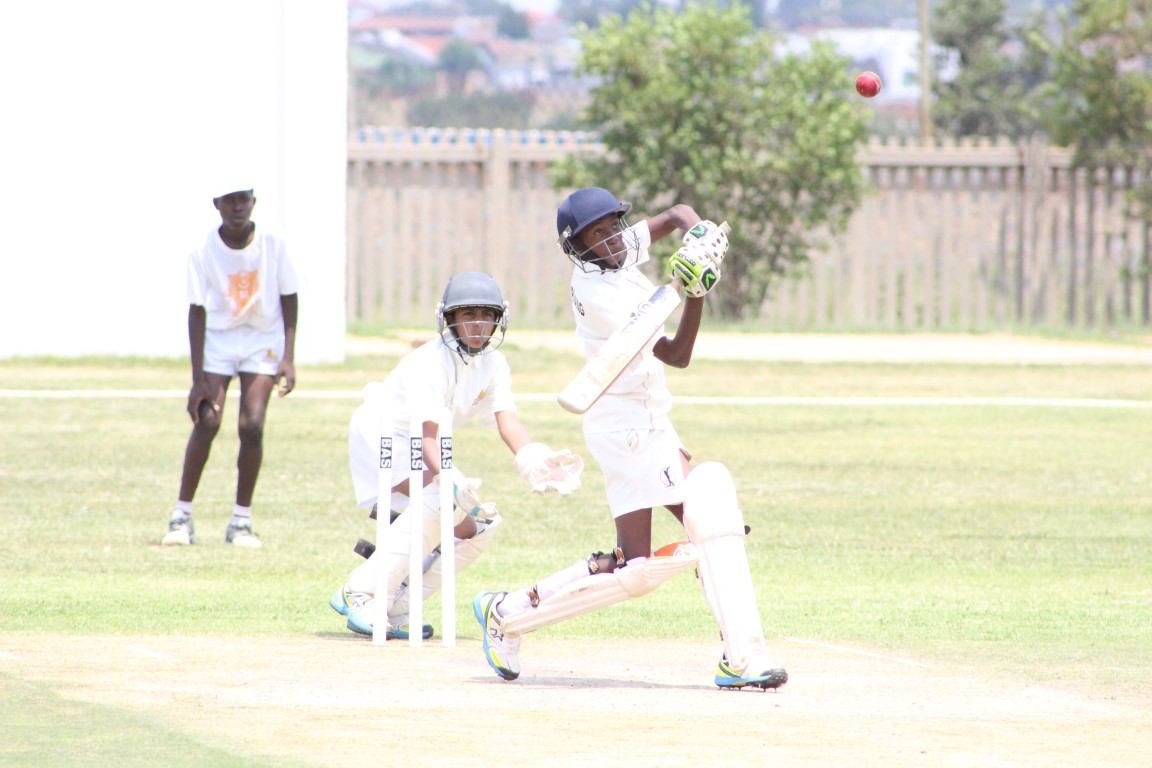 Last year, the DBE, SRSA and CSA signed an agreement to speed up cricket development at schools.
Last year, the DBE, SRSA and CSA signed an agreement to speed up cricket development at schools.
“This initiative provides us with an implementation model to, not only revitalise sports development in our townships and rural areas, but also to improve education outcomes in the basic education sector,” said Dr Grant Whittle, DBE Deputy Director-General.
“We value this partnership with CSA and look forward to growing the talent pool of black cricket players in our schools,” he added.
Dr Whittle was speaking during a visit to the Dobsonville Regional Performance Centre (RPC) in Soweto recently.
The visit was part of an awareness campaign to highlight the role that SRSA and the DBE are playing in CSA’s Hubs and RPC programme.
Dr Whittle acknowledged the intervention of the private sector in the National School Sport Programme and added that sport in schools is important because it helps learners to be healthier, fitter and strive to achieve academically.
As part of this agreement, the DBE and SRSA committed to work alongside CSA to put 58 cricket hubs into operation to develop cricketers in provincial academies and to run cluster leagues.
This will feed into the National School Sport Programme in the identified hubs.
Nozipho Xulu, acting Chief Director, social mobilisation and enrichment in education within DBE said the CSA hubs will open doors for many young cricketers who live in areas where the availability of facilities is a problem. They will also create a pathway for their success and address issues of transformation in this code.
Also SRSA will provide 10 schools with equipment in each of the hubs and ensure the establishment of cricket code committees for schools at district, provincial and national levels.
CSA General Manager for Cricket, Corrie van Zyl, said that the partnership plays a pivotal role in developing cricket in South Africa.
“With the RPC hubs programme into its second full year we are starting to see success stories emerging from around the country. CSA spends R20 million on this programme on an annual basis, and with the additional assistance from the DBE and SRSA, the programme will only grow as we look to unearth more cricketers from disadvantaged areas.” said Van Zyl.
He also gave feedback on the highlights of the partnership in the last year where 640 talented KFC mini-cricket players were identified during the provincial festivals and re-directed to the various RPC hubs to transition from softball to hardball.
“About 117 under-14 players from hubs took part in the SA Schools National Championships during 2015, creating an opportunity for the talented players to receive exposure to play in a provincial tournament,” said Van Zyl.
According to SRSA, the school sport programme is part of government’s efforts to create an active and winning nation.
*Tshepo Ramonoedi works for the Department of Basic Education.
